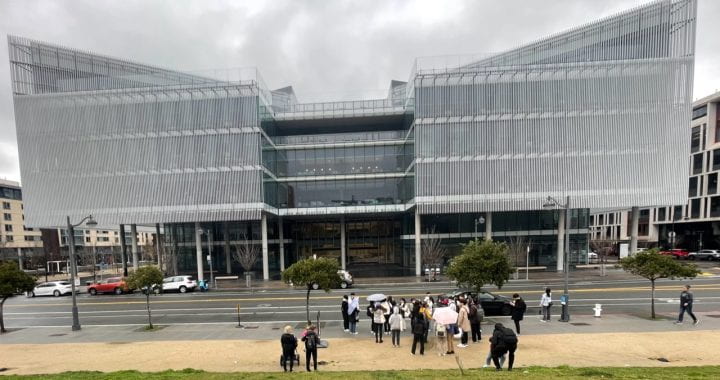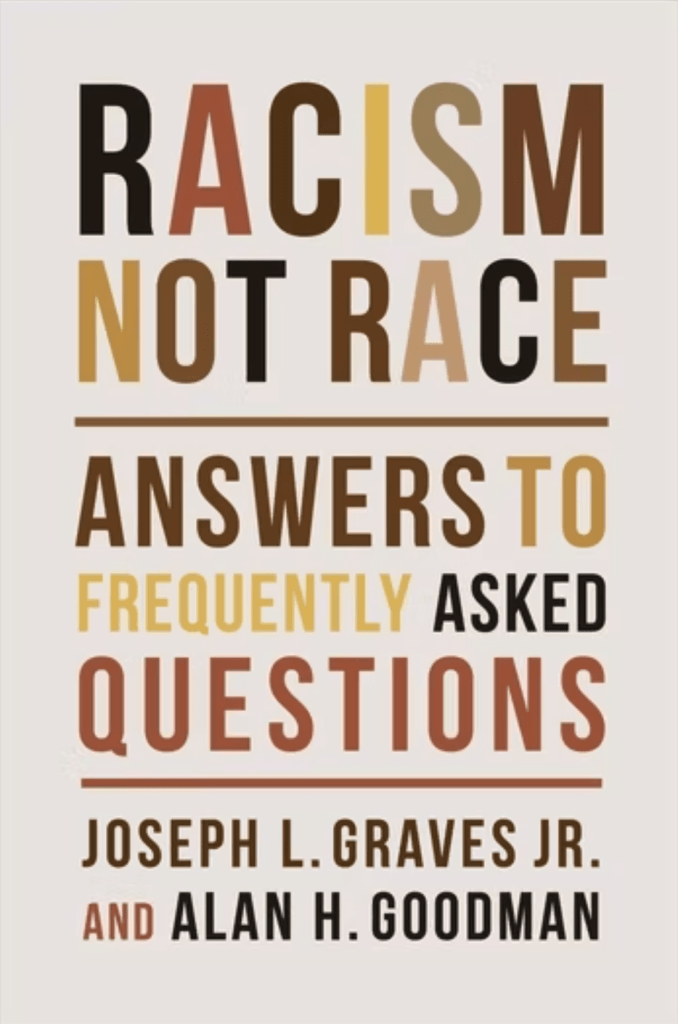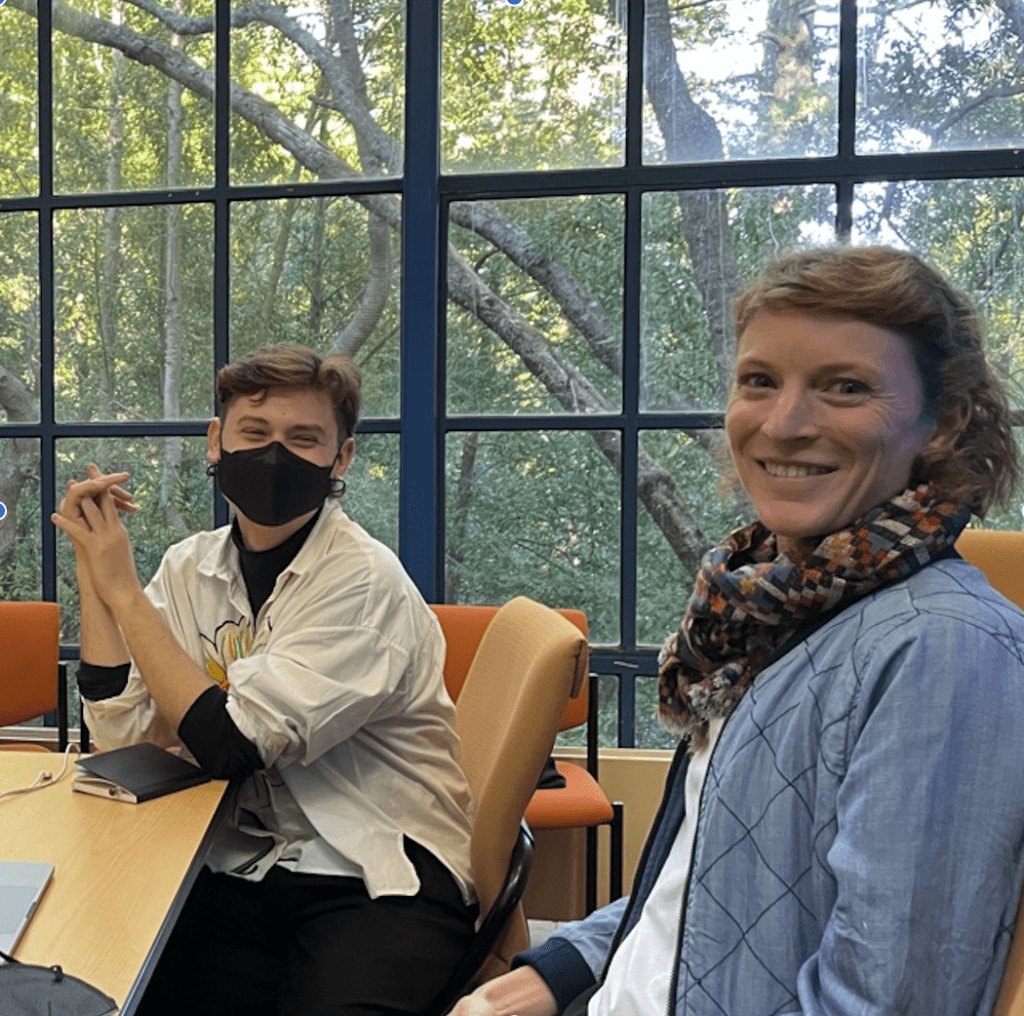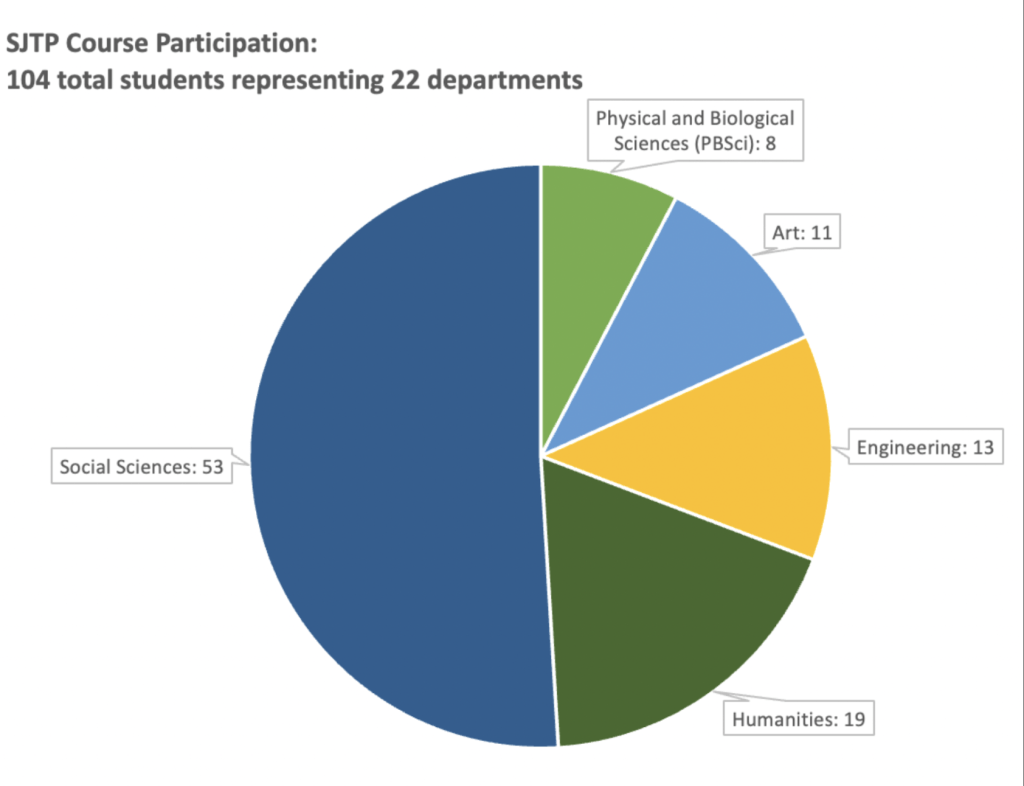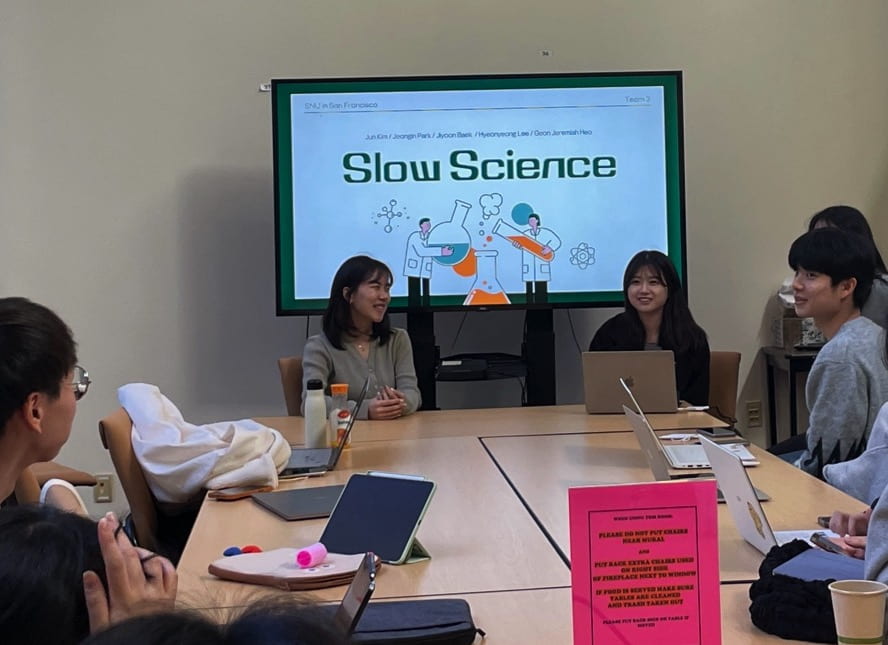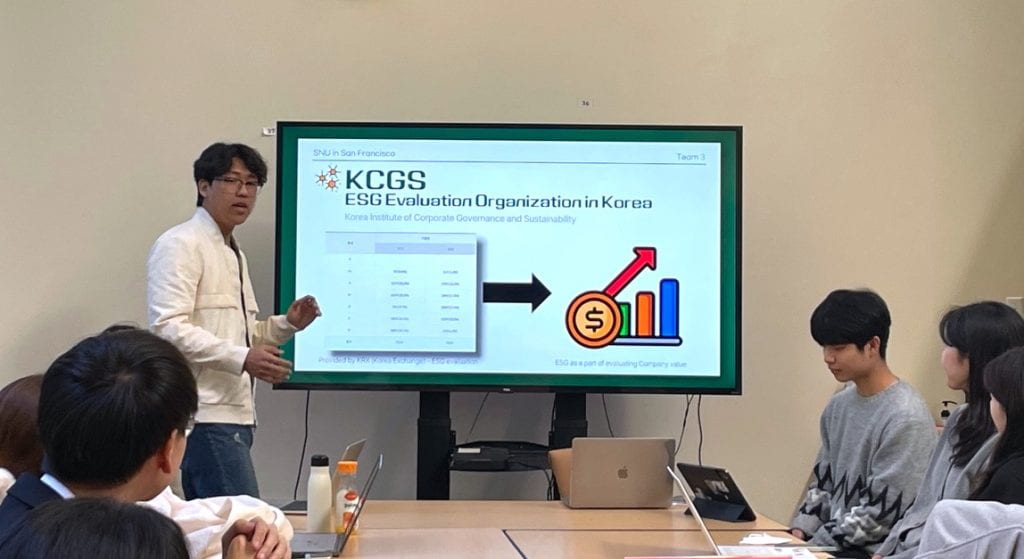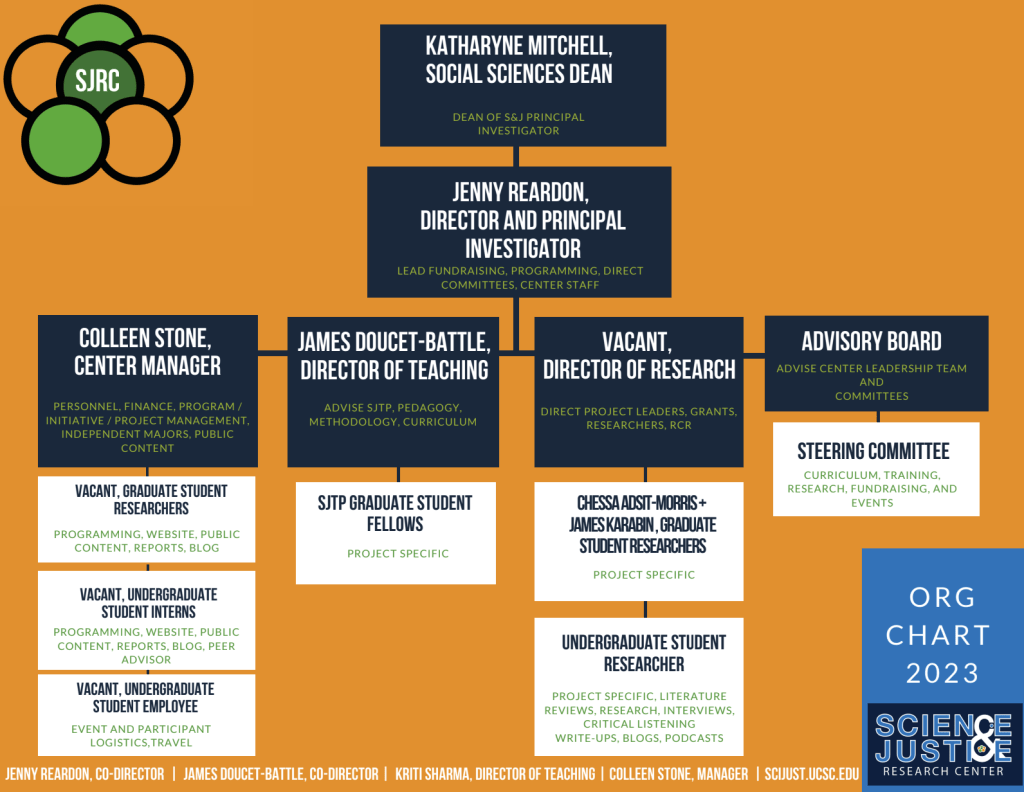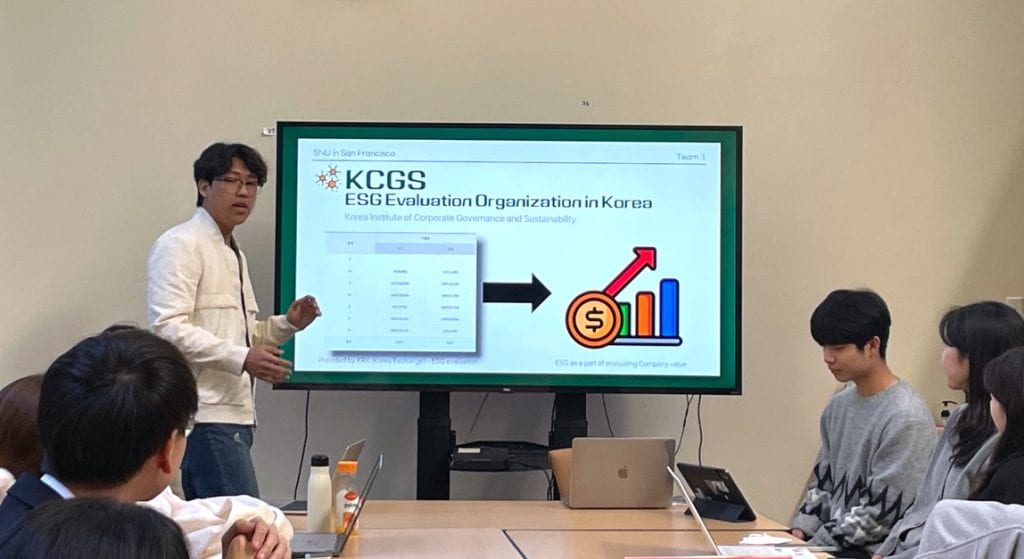Wednesday, May 15, 2024 – POSTPONED
Author Archives: Colleen Stone
May 1, 2024 (cancelled) | TechnoScience Improv
Wednesday, May 01, 2024 – CANCELLED DUE to the STRIKE.
12:15-2:00 PM
Humanities 1, Room 210
Join SJRC scholars in Humanities 1-210 for an improv discussion!
Co-sponsored by History of Consciousness: GeoEcologies + TechnoScience Conversations, Global and Community Health, and the Science & Justice Research Center
This two-hour roundtable improv (12.15-2.00pm) brings together ten UCSC scholars working on social, historical, and cultural studies of science, technology and medicine. The event will be structured around eight open, improvised conversations. Rather than structured around formal talks, each conversation will start with a question from a different panelist exploring emerging practices, speculative transformations, and critical imaginings of technoscience, health and ecology. With: Dimitris Papadopoulos (convener), Karen Barad, James Doucet-Battle, Kat Gutierrez, Maria Puig de la Bellacasa, Jenny Reardon, Warren Sack, Kriti Sharma, Matt Sparke, Zac Zimmer
Karen Barad is Distinguished Professor of Feminist Studies, Philosophy, and History of Consciousness.
James Doucet-Battle is an Associate Professor in the Department of Sociology and Co-Director of the Science & Justice Research Center.
Kat Gutierrez is an Assistant Professor in the History Department.
Dimitris Papadopoulos is Professor of History of Consciousness in the Department of History of Consciousness.
Maria Puig de la Bellacasa is Professor of History of Consciousness in the Department of History of Consciousness.
Jenny Reardon is a Professor of Sociology and the Founding Director of the Science & Justice Research Center.
Warren Sack is Professor of the Software Arts in the Film + Digital Media Department.
Kriti Sharma is an Assistant Professor of Critical Race Science and Technology Studies in Critical Race and Ethnic Studies.
Matt Sparke is Professor of Politics in the Politics Department and Co-Director of Global and Community Health.
Zac Zimmer is an Associate Professor of Literature in the Literature Department.
April 24, 2024 | Precision Public Health After Covid-19
Wednesday, April 24, 2024
4:00-5:30 PM
SJRC Common Room Oakes 231 + Zoom (registration)
Join SJRC scholars in Oakes 231 (or on Zoom) for an open discussion! This is a wonderful chance to engage with one another’s ideas, and support our own internal work! At this session, we will hear from Martha Kenney (Department Chair, Women & Gender Studies, San Francisco State University) and Laura Mamo (Health Equity Institute Professor of Public Health, San Francisco State University) on precision public health after Covid-19.
In the mi-2010s, a new paradigm called precision public health has emerged—part genomics, part informatics, part public health, and part biomedicine, touted as a data-driven public health revolution. This presentation reflects on the promises of precision public health in light of the Covid-19 pandemic, looking at how the “precision imaginary” has shifted when confronted with a global health crisis that exacerbated health inequities worldwide.
Martha Kenney (Ph.D. History of Consciousness, UC Santa Cruz) is a feminist science studies scholar whose research explores the poetics and politics of biological storytelling. Her current project examines and intervenes in the narratives emerging from the new field of environmental epigenetics, which studies how signals from the environment affect gene expression. Specifically, she looks at how assumptions about gender, race, class and sexuality influence the design of epigenetic experiments on model organisms and how we understand the relationship between bodies and environments. She has recent and forthcoming articles in Social Studies of Science, Science as Culture, Biosocieties and Catalyst: Feminism, Theory, Technoscience. Dr. Kenney teaches courses on the politics of science, technology, medicine and the environment.
Laura Mamo is the Health Equity Institute Professor of Public Health. Her work lies at the intersection of medical sociology, gender and sexuality studies, and cultural studies of science, technology and medicine. Her research and teaching focus on sexuality and its politics in medicine, science, and health discourse, practice, and resistance. Mamo is the author of the forthcoming book, Sexualizing Cancer: HPV and the Gendered Politics of Cancer Prevention (University of Chicago Press, 2023); Queering Reproduction: Achieving Pregnancy in the Age of Technoscience (Duke University Press, 2007); co-author of Living Green: Communities that Sustain (New Society Press, 2010); and co-editor of Biomedicalization Studies: Technoscience and Transformations of Health, Illness and U.S. Biomedicine (Duke University Press, 2010). Mamo is the co-founder of The Beyond Bullying Project, a multimedia school-based queer sexuality and gender project with Jessica Fields, Jen Gilbert and Nancy Lesko. Mamo’s research has received funding from the National Science Foundation, the Ford Foundation, the Robert Wood Johnson Foundation, and others. Mamo earned her PhD in 2002 from UCSF and BA from University of Wisconsin, Madison. She joined the faculty at SFSU as Health Equity Professor of Public Health in 2010 following appointments as Assistant Professor and Associated Professor of Sociology at the University of Maryland, College Park.
April 17, 2024 (POSTPONED) | Refiguring Worlds Through Local Voices? Epistemic Vulnerability in a Time of Climate Change in Kerala, India
Wednesday, April 17, 2024 – POSTPONED
Join SJRC scholars for an open discussion of works-in-progress, next January 2025! This is a wonderful chance to engage with one another’s ideas, and support our own internal work! At this session, next year, we will hear from visiting postdoctoral fellow Anna Bridel.
As climate change impacts intensify there are growing calls for alternative life-worlds to be imagined and brought in to being through the inclusion of local voices in environmental policymaking. At the same time, research has shown that platforming local environmental knowledge can often lead to an unexpected continuation of pre-existing relations of knowledge, politics and climate vulnerability. In this work in progress, Bridel will discuss ethnographic fieldwork from Kerala, India, where Cyclone Ockhi led to the death of over 200 fishers in 2017 but local fishing communities have been unable to influence dominant approaches to governing storm risk. In doing so Bridel will seek to develop the concept of ‘epistemic vulnerability’ as interactions between processes of making authoritative knowledge about the environment and vulnerabilization, to understand how fisher needs become silenced. Bridel gratefully welcomes any comments or feedback, especially on this analysis and the utility of epistemic vulnerability as a conceptual device.
Anna Bridel is a Visiting Fellow at the London School of Economics and Political Science.
April 10, 2024 | Sensing Landscapes, Hidden violence, and Atmospheres of Control
Wednesday, April 10, 2024
4:00-5:30 PM
Humanities 1, Room 210
Join Science & Justice Affiliate Lindsey Dillon (Sociology), for a roundtable discussion with Visiting Scholar Katherine Chandler and UC Davis faculty guests Caren Kaplan (American Studies) and Javier Arbona (American Studies, Design). We will gather in Humanities 1 Room, 210. Due to the sensitive nature of the discussion, Zoom will not be available.
Katherine Chandler, Caren Kaplan, and Javier Arbona discuss current research, examining how wartime, colonial and police violence seeps into everyday life by studying data, drone aircraft, explosions, airpower and traffic regulations. Their work grounds and situates discussions of the global public sphere and geopolitical control in specific landscapes and relationships, including connections to the Bay Area.
Lindsey Dillon is an Assistant Professor of Sociology at UC Santa Cruz.
Kate Chandler is associate professor of Culture and Politics in the School of Foreign Service at Georgetown University. Her research studies how technology and media create infrastructures that reinforce, challenge and transform the nation state and a global public. She is the author of Unmanning: How Humans, Machines and Media Perform Drone Warfare (Rutgers, 2023). Her second book, Drone Publics, examines the international networks that promote drone innovation in Africa, asking how the militaristic origins of drone aircraft are refashioned through commercial projects, humanitarianism and development.
Javier Arbona is an Assistant Professor with a dual appointment in American Studies and Design at UC Davis, and affiliations with Graduate Groups in Cultural Studies, Geography, and Community Development. At Davis he coordinates the Critical Military, Security, and Policing Studies research cluster. Explosivity: Following the Remains Across Landscapes is forthcoming (Minnesota, 2025). The book is an experimental archive of racialized exposures to explosive risks as found throughout landscapes of the San Francisco Bay Area since the arrival of nitroglycerin in 1866. Arbona co-founded Demilit, an experimental landscape collective that produces sound, fiction, and critical essays for arts and culture venues.
Caren Kaplan is Professor Emerita of American Studies at UC Davis. Her research draws on cultural geography, landscape art, and military history to explore the ways in which undeclared as well as declared wars produce representational practices of atmospheric politics. Her recent publications include Aerial Aftermaths: Wartime from Above (Duke 2018) and Life in the Age of Drone Warfare (Duke 2017).
Book release! Teaching Environmental Justice: Practices to Engage Students and Build Community (Edward Elgar Publishing, 2023)
About the Book

Teaching Environmental Justice: Practices to Engage Students and Build Community (Edward Elgar Publishing, 2023)
This ground-breaking book explores ways to integrate environmental justice modules into courses across a wide variety of disciplines. Recommending accessible, flexible, and evidence-based pedagogical approaches designed by a multidisciplinary team of scholars, it centers equity and justice in student learning and course design and presents a model for faculty development that can be communicated across disciplines.
• Reflection on how to teach inclusively across disciplines, with a focus on community-based faculty development.
• Presentation of a blend of insights from diverse disciplines, including art, astronomy, ecology, economics, history, political science, and online education.
• A focus on how to stimulate student engagement to improve students’ empirical and conceptual understanding of environmental politics.
• Detailed instructions for both introductory and more advanced active learning assignments and classroom activities, including guidance on how to manage common challenges and adapt activities to specific learning environments, particularly online formatsProviding detailed instructions and reflections on teaching effectively and inclusively, Teaching Environmental Justice will be an invaluable resource for faculty and graduate students teaching modules in environmental justice in courses across disciplines. It will also be essential reading for researchers of teaching and learning seeking insight into cutting-edge classroom practices that center equity and justice in student learning.
This is an open access title available under the terms of a CC BY-NC-ND 4.0 License. It is free to read, download and share on Elgaronline.com.
Publication Date: 2023 ISBN: 978 1 78990 505 2 Extent: 300 pp
SJRC Annual Report 2022-2023
Volume 16
Director’s Letter: Welcome to Science & Justice
As we look forward to the year to come, we appreciate the chance to share with you our accomplishments of the last year.
Science & Justice continues to be in the headlines, making a critical difference in California, the nation and globally. This year our faculty served as advisors and reviewers for the National Academies of Sciences, Engineering and Medicine effort to create a framework for governing emerging health technologies in a manner that centers equity, and launched the Leadership in the Ethical and Equitable Design (LEED) of STEMM initiative with a commentary released in Cell magazine. As part of SJRC’s long standing goal to transform institutional structures so that they support a much more diverse range of scholars, we launched our Sociology of Science and Technology Studies Pathways Project. Finally, in partnership with the Office of International Affairs (OIA) at Seoul National University we launched an international winter school on Innovation, Science and Justice.
Our events continued to highlight the unusual and inspiring collaborations and conversations Science & Justice creates. In addition to our regular Works-in-Progress sessions and Working Group sessions, this year we co-hosted with Professor Jennifer Derr (History) and the UCSC Humanities Institute the Race, Empire, and the Environments of Biomedicine Sawyer Seminar Series. Tahir Amir, founder and executive director of the Initiative for Medicines, Access & Knowledge (I-MAK), launched the series in front of a packed house at the Kuumbwa Jazz Center.
Continuing our innovative pedagogical work, this year we worked in collaboration with the Department of Critical Race and Ethnic Studies under the leadership of Professor Christine Hong to plan a first of its kind Science and Justice minor. We also worked with Assistant Professor Karen Miga (Biomolecular Sciences and Engineering) to curate and kick-off the Bioethics Lecture Series. The series was launched with a talk by Professor Joseph Graves (MacKenzie Scott Endowed Professor, Biology, North Carolina A&T State University) on Racism, Not Race: Answers to the most critical questions.
Our work supporting research infrastructures across campus and across universities also deepened this year. Through our work creating the Science and Justice Minor and supporting cross-divisional grants, we continued to build avenues for communication and mechanisms of support that brought together faculty, students and staff from all five divisions. The NSF LEED STEMM grant supported building research infrastructure across six universities. Through the Mellon and NSF funding, we also were able to offer fellowships to four graduate students and one postdoctoral fellow to work in the critical, emerging areas of inquiry at the interface of science and justice.
Despite ongoing complications from the pandemic, the 2022-23 academic year also produced much to celebrate. Congratulations to many affiliated faculty who were promoted and received tenure – and those who published books – a special feat of the industries, especially during a pandemic! We look forward to finally celebrating this coming year. Congratulations to affiliated faculty Sharon Daniel and Anna Friz, both in film and digital media, for being awarded Guggenheim Fellowships! Read about their projects in this campus news article.
As we plan the year ahead, we are excited to welcome many new faculty and to reimagine with them the future of science and justice! We also look forward to welcoming and working with Associate Professor James Doucet-Battle as SJRC co-director.
We are ever thankful for the guidance and support our steering committee and board of advisors continue to provide us, as well as the support of many units and divisions on campus.
Jenny Reardon
Founding Director, Science & Justice Research Center, Professor of Sociology, UC Santa Cruz
Science & Justice Leadership Team
Founding DIRECTOR | Jenny Reardon, Professor of Sociology
DIRECTOR of Teaching the SJTP | James Doucet-Battle, Associate Professor of Sociology
CENTER MANAGER | Colleen Stone
GRADUATE STUDENT RESEARCHER | Chessa Adsit-Morris, History of Art and Visual Culture
Science & Justice Steering Committee
Jennifer Derr, Associate Professor of History
James Doucet-Battle, Associate Professor of Sociology
Lars Fehren-Schmitz, Professor of Anthropology
Lise Getoor, Professor of Computer Science
Dee Hibbert-Jones, Associate Professor of Digital Art and New Media
Jaimie Morse, Assistant Professor of Sociology
Jenny Reardon, Professor of Sociology
Matt Sparke, Professor of Politics
The Science & Justice Mission
The Science & Justice Research Center at the University of California, Santa Cruz is a globally unique endeavor that innovates experimental spaces, engages in collaborative research practices, and fosters emerging alliances between seemingly disparate sectors, disciplines and communities. Biomedical innovation, species extinction, toxic ecologies, access to healthcare, and many other contemporary matters of concern provoke questions that traverse multiple intellectual, institutional and ethico-political worlds. Science & Justice generates modes of inquiry and empirically rigorous research that address these enormous challenges and support livable worlds. The Center is home to the Science and Justice Working Group, the Science and Justice Graduate Training Program (SJTP) and sponsored research projects. The initiative builds on the UCSC campus’ historic commitments to socio-ecological justice and strengths in science studies and interdisciplinary research.
Sustaining a Vibrant SJRC Community
The Science & Justice Research Center supports a vibrant, collaborative community. Located in Oakes College, SJRC hosts visitors from across the UC system and around the world. The SJRC community is committed to sustaining an experimental ecosystem for novel ideas, dialogues, methods and collaborations. The Science & Justice Working Group remains the heart of our collective work. We also host regular reading groups and experimental mixers with affiliated graduate students and faculty who seek to further investigate the meanings and practices of science and justice.
Visiting Scholar Program
Since 2009, the SJRC Visiting Scholars Program has been a vibrant hub for interdisciplinary scholars across the UC-system, the nation and the globe. The Science & Justice Research Center offers opportunities for visiting scholars at all levels of their career (regardless of institutional affiliation) to participate in the community through research collaborations, reading groups and experimental mixers. In the 2022-2023 academic year, the Center continued hosting visiting scholars and remote exchanges. Refer to Appendix 1 to learn more about all our visitors.
This year we established the SNU in the World Program on Innovation, Science and Justice. Administered by the Office of International Affairs (OIA) at Seoul National University, the SNU Program is a university-led and government-funded initiative to train undergraduate students to be globally engaged scholars and leaders. The highly-competitive SNU in the World Program at UC Santa Cruz–one of five two-week training programs selected for funding–focuses on Innovation, Science and Justice. Other SNU Programs include visits to Washington DC (public policy), Japan (sustainable development), and Australia (climate crisis). More information can be found under our pedagogy.
Highlights from the Science & Justice Working Group, Experimental Mixers, Writing and Reading Groups
The Science & Justice Working Group (SJWG) provides a convivial and novel space to cultivate emerging connections, spark new questions for research, and nurture our communities’ collaborative ties. In addition to formally convening, our lively informal experimental mixers open space for all SJRC community members.
Below are some highlights of the year’s events (all events are listed in Appendix 2).
On October 12, the Center began the academic year by hosting our annual Meet & Greet. In addition to a chance to celebrate the new academic year and enjoy each other’s company, the annual gathering is always a great chance to welcome new members, welcome back others, and share current work to foster emerging collaborations.
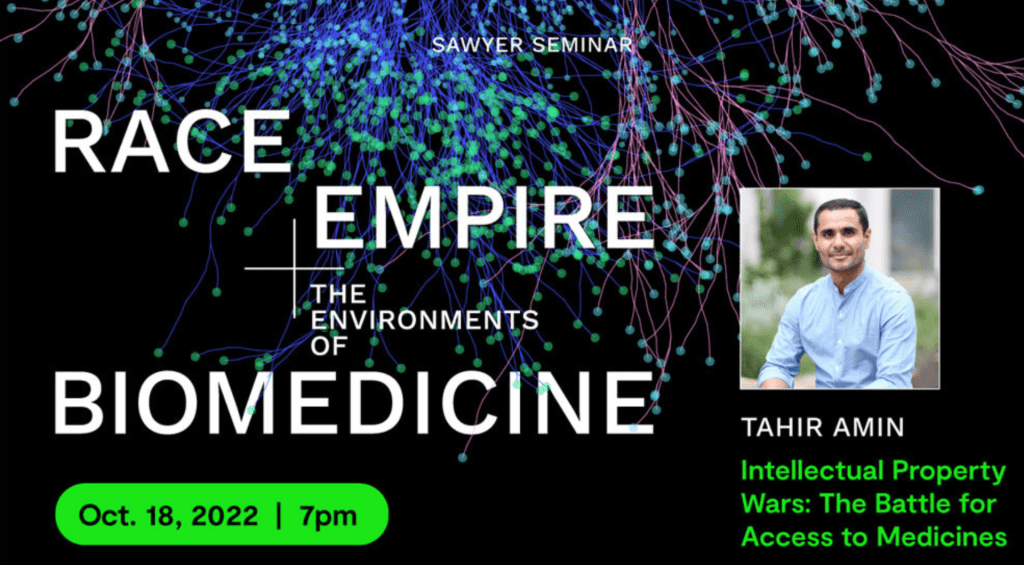
Inaugural Seminar Speaker, Tahir Amin; founder and executive director of the Initiative for Medicines, Access & Knowledge (I-MAK).
On October 18, we celebrated the launch of the Race, Empire, and the Environments of Biomedicine Sawyer Seminar Series. Inaugural Seminar Speaker, Tahir Amin; founder and executive director of the Initiative for Medicines, Access & Knowledge (I-MAK), a nonprofit organization working to address structural inequities in how medicines are developed and distributed; presented at the Kuumbwa Jazz Center in downtown Santa Cruz on Intellectual Property Wars: The Battle for Access to Medicines. A recording is available here. Amin and I-MAK have also put out a 10-point plan for the Biden-Harris administration to bring equity into the patent system. Their work was highlighted in the campus news article, “Tahir Amin to speak about unequal access to medications and the global fallout from intellectual property wars: October 18 talk in downtown Santa Cruz.”
Then, on Wednesday, October 19, the Center for Cultural Studies co-hosted an in-person reading group on Technological Colonialism: The Political Economy of Innovation and Global Health. Other Sawyer Seminars included talks by Kaushik Sunder Rajan (Professor of Anthropology and Co-Director of the Chicago Center for Contemporary Theory at University of Chicago) on Ethnographic Trans-formations: Cases, Life Histories, and Other Entanglements of Emergent Research, Alberto Ortiz-Díaz (Assistant Professor of History at the University of Texas, Arlington, and currently a Larson Fellow at the Kluge Center, Library of Congress) on Carceral Care: Health Professionals and the Living Dead in Colonial Puerto Rico’s Sanitary City, 1920s-1940s, Wangui Muigai (Assistant Professor at Brandeis University in the departments of History, African & African American Studies and the Health: Science, Society, and Policy Program)on Fighting for Life: Race and the Limits of Infant Survival, Karina L. Walters (Choctaw, Director of the Tribal Health Research Office at the National Institute of Health) on Transcending Historical Trauma: How to Address American Indian Health Inequities and Promote Thriving, Anna Barry-Jester (public health reporter with ProPublica) on From Symptom to Story: Understanding an Epidemic of Kidney Disease in Central America, and concluded with Juan Sebastian Gil-Riaño (Assistant Professor of History and Sociology of Science at the University of Pennsylvania)on Stolen Evidence: Indigenous Children and Bio-historical narratives of the Western Hemisphere during the Cold War. More on the seminar can be found in this campus news article: UC Santa Cruz receives Mellon Foundation humanities grant to investigate race, biomedicine and on the project website.
Science & Justice Training Program Fellows Carrie Hamilton (Environmental Studies) and Kellie Petersen (Sociology) kicked off the Works-in-Progress Series on October 26 by presenting their collaborative research on the system of servers and associated technologies that underpin the global shared network of computers, computing power, and data storage, commonly referred to as “the Cloud” or cloud computing. For their Training Program project, they are interested in exploring how the material dimensions of the Cloud–and the sense of amorphousness that it conjures–exacerbate social and environmental injustices by investigating the physical infrastructures, natural resources, and human labor that underpin large data centers. Other Works-in-Progress sessions included visiting scholar Lindsay Kelley (Senior Lecturer in the College of Arts & Social Sciences School of Art & Design at Australian National University and a UC Santa Cruz Alum MFA Digital Arts & New Media, Ph.D History of Consciousness). At this session we brainstormed approaches to a book project called, Baking Strange, whose themes included: edible archives, everyday militarisms, recipe art, participatory methods, and digestive networks.
In January and February 2023, the SJRC hosted SNU in the World Program Director and Professor of Science Studies Doogab Yi along with four graduate students and 24 undergraduate students for a two-week training program on Innovation, Science and Justice. More details can be found under our pedagogy.
On April 05 we helped affiliated faculty Karen Miga (BME) curate and kick-off the semiweekly Bioethics Lecture Series with a talk by Joseph Graves on his book (pictured). Graves is a professor of biological science at North Carolina Agricultural and Technical State University and former associate dean for research at the Joint School for Nanoscience and Nanoengineering and has written extensively on genetics and race including his book Racism, Not Race: Answers to Frequently Asked Questions (Columbia University Press, 2023).
The Bioethics Lecture Series for BME 80G also included talks by Krystal Tsosie (Diné/Navajo Nation, Assistant Professor in the School of Life Sciences at Arizona State University) on Referring to Whom? The ‘Indigenous Reference Genome,’ Zac Zimmer (UCSC Associate Professor of Literature) on Metaphors for Models, Benjamin Hale (Assistant Professor of Environmental Studies and Philosophy at the University of Colorado, Boulder) on Clean Meat and Muddy Markets: Substitution and Indeterminacy in Consumerist Solutions to Animal Agriculture, Victoria M. Massie (Assistant Professor in Anthropology at Rice University) on Of Albert Perry: A Biomythography of Genetic African Origins, Hank Greely (Professor by courtesy of Genetics, Stanford School of Medicine; Director, Center for Law and the Biosciences; Director, Stanford Program in Neuroscience and Society; and Chair, Steering Committee of the Center for Biomedical Ethics) on Weird Sh!t: Organoids, Chimeras, and Embryo Models, Marcy Darnovsky (Executive Director at the Center for Genetics and Society) on Should We Genetically Modify Our Children?, Alexandra Minna Stern (Humanities Dean and Professor of English and History, and at the Institute for Society and Genetics, at the University of California, Los Angeles) on Eugenics, State Harm, and Reparations in California: An Unfinished History, Susan Reverby (Marion Butler McLean Professor Emerita in the History of Ideas; Professor Emerita of Women’s and Gender Studies at Wellesley College) on Examining Tuskegee: The Infamous Syphilis Study and its Legacy.
We also celebrated several SJRC affiliated faculty’s new books, including Contesting Race and Citizenship: Youth Politics in the Black Mediterranean (Cornell University Press) by Camilla Hawthorne (sociology) and Unsettled Borders: Militarized Border Technologies and Indigenous Sacred Science (Duke University Press) by Felicity Amaya Schaeffer (feminist studies).
Justice Sparks Innovative and Original Research
The Science & Justice Research Center continues to be an exemplar of how to transform commitments to justice into collaborative research projects. We formulate new methods and institutional practices where scientists and engineers work alongside social scientists, humanists, ethicists, artists and diverse public communities. SJRC affiliates pursue local, regional, national, and international research collaborations on issues that inform and affect institutional and public policy.
In 2022-2023 the center focused on several ongoing and new projects. In Summer 2022 we learned that the National Science Foundation awarded SJRC Director Jenny Reardon $400,000 to fund the first phase of the Leadership in the Ethical and Equitable Design (LEED) of Science, Technology, Engineering, Mathematics and Medicine (LEED of STEMM) Initiative. This initiative aims to clarify, review, and revitalize the roles and value of engaging bioethicists and scholars in the social sciences, humanities, and the arts in STEM research. Learn more in this campus news article: National Science Foundation grant will help establish ethics and equity best practices for emerging forms of science and technology and in this CellPress publication, “Trustworthiness matters: Building equitable and ethical science” that announces the collaborative project.
In addition to the NSF, this project is supported in part by the National Center for Advancing Translational Sciences, the National Institutes of Health, the UC Santa Cruz Office of Research, and the UC Santa Cruz Institute for Social Transformation. The co-leads of LEED STEMM and the research team are made up of faculty and students from UC Santa Cruz, Columbia University, the University of Washington, Stanford, UCLA and Harvard.
As part of SJRC’s long standing goal to transform institutional structures so that they support a much more diverse range of scholars, we also continued our efforts to Build Diversity in Sociology and Science and Technology Studies. Last year, we worked with Dr. Joseph Graves, Professor of Biomolecular Engineering, and Dr. Checo Rorie, Chair of the Department of Biology, at North Carolina A&T State University to strengthen ties between our two universities. With support from the Graduate Division, and in collaboration with the faculty and staff in the Genomics Institute, we have begun to develop initiatives that will facilitate student and faculty exchanges, co-taught summer workshops, and expanded research opportunities that will sustainably connect both campuses. We aim to avail UCSC students from diverse backgrounds of the opportunity to experience the pedagogical and research cultures of an Historically Black College and University (HBCU), while offering NCATSU students a reciprocal opportunity to visit UCSC, study with faculty working in genomics, and work closely with UCSC researchers and students in laboratories across Science Hill.
Funding Faculty, Undergraduate and Graduate Student Research
SJRC projects and Training Programs support many faculty through course releases and research funds, graduate students with research fellowships, and undergraduate students with paid research opportunities and independent study units.
This year, through a gift from the SNU in the World Program, in Winter 2023, SJRC awarded $17,000 in research funds to nine affiliated faculty or campus units and $1,500 to three graduate students fellowships to participate in lectures and present on original and collaborative research. Funds were set aside to support a graduate student researcher to help plan and implement the Winter 2024 visit. Pictured are James Karabin (sociology) and Chessa Adsit-Morris (visual studies) who presented on the Leadership in the Equitable and Ethical Design (LEED) of STEM Research Initiative.
While not awarded at the campus level for seed funding, the Humanities Division awarded faculty affiliate and CRES chair Christine Hong and SJRC Director Jenny Reardon $40,000 to organize the Science and Justice Minor Research and Planning Cluster. In this $8,000 was issued to affiliated faculty and a graduate student was hired; remaining funds will contribute towards future planning and launch activities.
As part of the Race, Empire, and the Environments of Biomedicine Series funded by the Andrew W. Mellon Foundation, two graduate student researchers were hired alongside a postdoctoral fellow to work with PI’s Jennifer Derr (history) and Jenny Reardon (sociology).
Similarly, sponsored by a National Science Foundation ER2-Ethical & Responsible Research grant overseen by SJRC Director Jenny Reardon, the Leadership in the Equitable and Ethical Design (LEED) of STEM Research Initiative supported two graduate researchers. In anticipation of potentially not being able to hire a one-year postdoctoral fellow as planned (as union contracts were beginning negotiations), great consideration was given to shift some of that support for more graduate student researchers including one at the University of Washington. The teams are also adding ways undergraduates can get involved next year.
Additionally, SJRC continues to assist students in identifying and applying for campus funding to conduct original and collaborative research. Such awards have been granted from the Undergraduate Research in Science & Technology Endowment, the Genomics Institute’s Research Mentoring Internship Program, and the Institute for Social Transformation’s Building Belonging Program. This year, campus funding was awarded to undergraduate Science & Justice researchers through the Institute for Social Transformation’s Building Belonging Program (Andrea Asher, Sociology, Human Biology, Camryn Newburn, Anthropology, Dimitri Cardona, Sociology Fall 2022-Spring 2023.
For a complete list of the ongoing research our community conducted, refer to Appendix 3.
Creating a UCSC Ethics in Practice
At an increasing rate, many forms of scientific evidence are met not just with questions of curiosity and interest, but also with skepticism and mistrust. Healthcare systems are challenged by entrenched inequalities and profit motives. Algorithms encode bias into the heart of big data approaches to science and engineering. The next generation of leaders in biomedical and life sciences, environmental science, and engineering need to be adept at addressing these challenges. At SJRC, we believe this requires bold new approaches to ethics and research practice in STEM fields. We strive to exceed narrow standards for the ethical approval of science and prepare and support our students and faculty to be powerful stewards of socially robust and reflexive science. Our vision of good science exceeds simple compliance and strives towards institutional change. We work with affiliates to realize this in practice. Examples of our efforts from this year are described below.
A Model for Building Diversity and Interdisciplinarity
National calls for increased attention to diversity, equity, and inclusion in all phases of STEM research, from project inception to publication, have led to an increasing demand for scholars trained in STS who can provide guidance to STEM researchers and serve as collaborators on STEM research teams. Yet the lack of diversity in STS threatens to reproduce the same hierarchies of race, gender, class, and sexuality that have long been documented in STEM fields, as well as the broader societal barriers to equity and justice that these calls seek to address. While substantial resources have been allocated to address pipeline issues in STEM and to a lesser extent the social sciences, to our knowledge, few exist that specifically focus on training the next generation of STS scholars of color who can provide critical guidance and nuanced expertise on justice and equity concerns in STEM. Despite this growing demand, there is little guidance on best practices for fostering this integration or for evaluating its effects. As efforts to increase the diversity of both researchers and the researched in STEM have gained in prominence, the number of African and Indigenous descent PhDs working in STS remains low in the United States.
In 2022-2023 Science & Justice continued its history of initiating bold new collaborations and under the direction of Associate Professor of Sociology and SJRC Associate Director of Teaching James Doucet-Battle, we continued a study to Build Diversity in Sociology and Science and Technology Studies. We focussed our efforts on applying for a grant from the UC-HBCU initiative to strengthen UCSC’s efforts to attain and support graduate students. We worked closely with the Office of Research and the Division of Graduate Studies to coordinate staff and faculty in multiple divisions, departments, resource and cultural centers, and campus student success units to identify student and faculty needs and structural barriers to writing, receiving and supporting UC-HBCU grants. We created agreements and tools to better holistically address these needs and barriers. Our work is resulting in holistic institutional support from central administration while we build partnerships between UCSC and HBCU faculty.
Finally, we continued our work with Genomics Institute staff and faculty to collaborate on integrating a concern for ethics and justice into genomics research. James Doucet-Battle (Sociology), Jenny Reardon and Colleen Stone worked with Lars Fehren-Schmitz (Anthropology), Angela Brooks (BME), Karen Miga (BME) and Zia Isola to reconceive Genomics and Society work.
This year we continued our efforts to create a more robust approach to ethics grounded in interdisciplinary collaboration through our partnership with the Institute for the Biology of Stem Cells. Working with Camilla Forsberg (Biomolecular Engineering) and Lindsay Hinck (Molecular, Cellular and Developmental Biology), we created a Science and Justice training component for the successful EDUC 4: CIRM Research Training Grant “CIRM Scholar” Award. With the Stem Cell Journal Club, we hosted a joint session with students from Seoul National University. We look forward to continuing working with them, and to expanding training opportunities in stem cell research to include a critical focus on questions of ethics and justice. See this UCSC news story for more information.
Leadership in the Equitable and Ethical Design (LEED) of STEM Initiative
To clarify, review, and revitalize the roles and value of engaging bioethicists and scholars in the social sciences, humanities, and the arts in STEM research, SJRC launched a national and international collaborative initiative informally called LEED. The Leadership in the Ethical and Equitable Design (LEED) of STEM Research Initiative proceeds in three phases: background research; drafting of LEED Principles and Practices; and International Discussion and Write-Up of LEED Principles and Practices. SJRC Founding Director and Professor of Sociology Jenny Reardon was the PI of a successful grant application to the National Science Foundation ER2-Ethical & Responsible Research ($399.994) that supports the first phase. Sandra Soo-Jin Lee (Columbia University) and Mildred Cho (Stanford) are the co-PIs, and Evelynn Hammonds (Harvard), Aaron Panofsky (UCLA), Malia Fulteron (University of Washington), and Sara Goering (University of Washington) are senior personnel.
For a complete list of the ongoing research our community conducted, refer to Appendix 3.
Science & Justice Pedagogy
In addition to sparking innovative research, since its beginning the SJRC has supported the creation of innovative pedagogy that fosters transdisciplinary collaborative learning that brings together faculty and students from across the UC Santa Cruz campus, from engineering, physical and biological sciences, social sciences, humanities, and the arts.
Science & Justice Graduate Training Program
The SJRC is home to the globally unique Science & Justice Training Program (SJTP). The program teaches graduate students from across all five divisions how to collectively address the moments where questions of science meet questions of justice.
Started in 2010 with a grant from the National Science Foundation, the internationally-recognized Science & Justice Training Program (SJTP), draws together masters, early career PhD students and faculty from across all five Divisions of the University. Students who took the training program’s introductory course Science & Justice: Experiments in Collaboration in the Winter 2022 term with SJRC Director of Teaching James Doucet-Battle, entered the program in Spring and Fellows began conducting original research and collaborative projects over the summer. In the 2022-23 academic year, Doucet-Battle mentored graduate students who chose to go on to get a Science & Justice graduate certificate.
The seminar will be offered again in Winter 2024 and taught by incoming professor Kriti Sharma (CRES) who was hired to teach for the new Science and Justice minor, which requires a clear commitment to and willingness to lead programmatic and curricular development.
Over the last 12 years, the introductory course for the Science & Justice Training Program has trained 104 graduate students representing 22 different UC Santa Cruz departments in creative approaches to science and justice. Participating in the program helps students build their careers and catalyzes new collaborative initiatives within the university. Our students have already had considerable early career success, demonstrated by their successful applications for fellowships, grants, postdoctoral positions and innovative entrepreneurial efforts.
Building Science and Justice Undergraduate Curriculum
UC Santa Cruz offers a wide range of courses across its many disciplines that address the relationships between science, society and justice. Science & Justice affiliates have long desired to create a large core course that would teach undergraduates the fundamentals of Science and Justice. Over this last year, SJRCs Steering Committee continued to discuss the potential with faculty and staff across campus for creating a minor in Science and Justice. A Science and Justice minor could offer students an opportunity to learn the transdisciplinary field of science and justice studies while at the same time receiving training in their major discipline. SJRC will continue to gather faculty to discuss and conceptualize new courses and a proposal for a minor in Science and Justice to be hosted by the newly established Critical Race and Ethnic Studies (CRES) department. With Christine Hong (Chair of CRES), and support from Humanities for a Science and Justice Minor Hub and Research Cluster, faculty met to develop the minor over the 2022-2023 academic year. They also ran a faculty search for a position up to Associate Professor III in Critical Race Science and Technology Studies (STS) which resulted in the hiring of above mentioned Kriti Sharma who is a microbial ecologist and philosopher whose work bridges biology, philosophy, and art to re-tell “the story of life” not as struggle and scarcity, but as radical interdependence.
SNU in The World Program on Innovation, Science and Justice
New this year is a multi-year partnership with Seoul National University, the SNU in the World Program with SJRC at UCSC on Innovation, Science and Justice. In January and February 2023, the SJRC hosted SNU Associate Professor of Science Studies Doogab Yi (pictured with SJRC Director Jenny Reardon), 4 graduate students and 22 undergraduate students from majors including the biological sciences, chemistry, computer science, engineering, industrial design, philosophy, sociology, english, business administration, and fashion design for a two-week training program.
Students participated in an in-depth series of lectures, workshops, reading groups, with affiliated faculty at UC Santa Cruz, UC San Francisco, and Stanford along with field trips to the surrounding Bay Area museums, cultural centers, and sites of innovation such as Google focused on exploring some of today’s most pressing issues including biomedical innovation, environmental justice, climate change, health equity, and toxic ecologies. A welcome dinner at the Oakes College Provost House, a dinner with Everett Program Fellows and a final student presentation over lunch were also planned.
Here are SNU students in a group lecture in the Oakes College Mural Room with Tiffany Wise-West the Sustainability and Climate Action Manager, City of Santa Cruz. Tiffany, a Science & Justice Training Program Alum, was in conversation with the UCSC Sustainability Office (Sustainability & Equity Special Projects Manager Ileana Brunetti with Student Sustainability And Environmental Justice Ambassador Izzy Layne, and Water & Climate Action Manager Ellen Vaughan) on Innovative Relationships, Environmental Justice and the City. Image by Jenny Reardon.
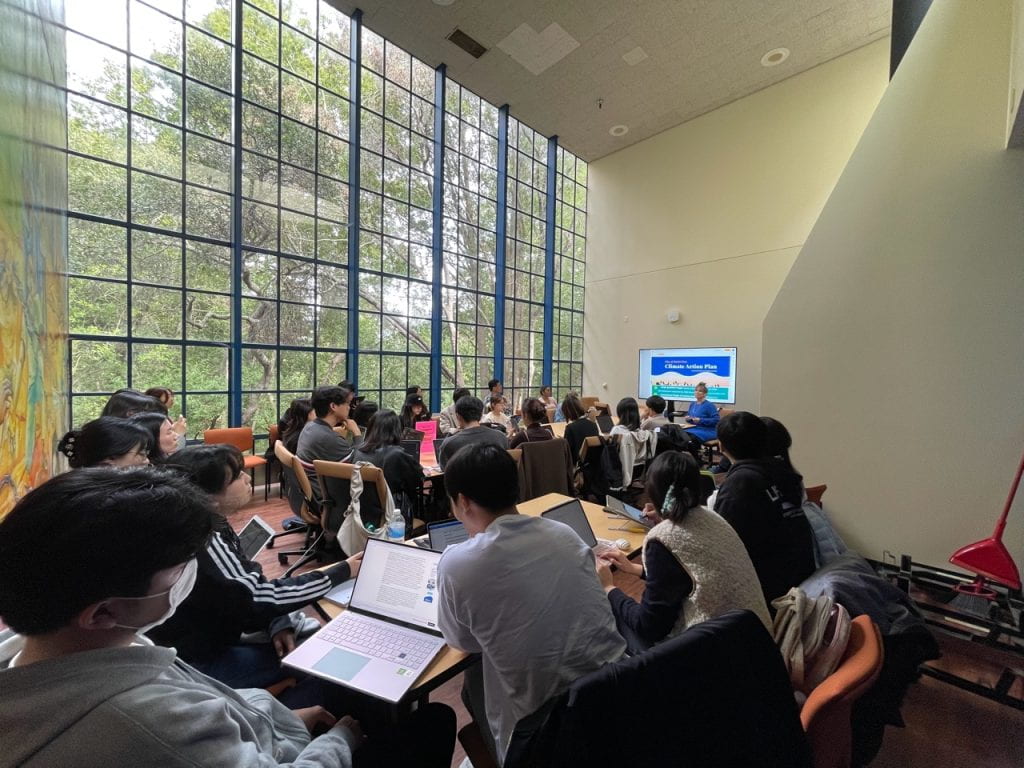
SNU students in a group lecture in the Oakes College Mural Room with Tiffany Wise-West the Sustainability and Climate Action Manager, City of Santa Cruz.
Pictured here are SNU students presenting on the concept of Slow Science while another group presents on governance and sustainability in Korea. Images by Jenny Reardon.
Pictured below are SNU students with the UCSC IBSC Stem Cell Journal Club in a lecture on the ethics of biotechnology with Professor Jenny Reardon. Image by Chessa Adsit-Morris.
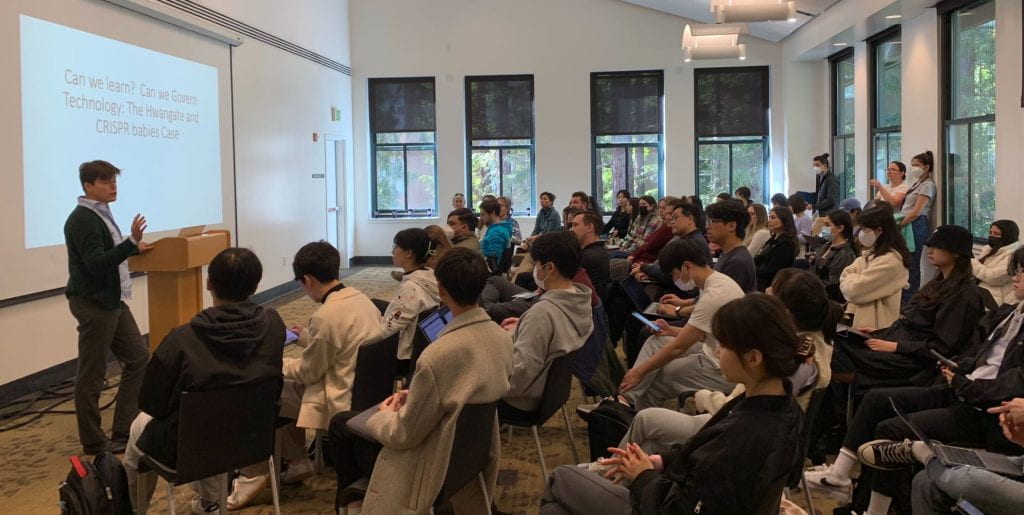
Jenny Reardon with SNU students and the UCSC IBSC Stem Cell Journal Club in a lecture on the ethics of biotechnology.
Refer to the Winter 2023 Schedule, Participant Biographies and the Rapporteur Report.
Funding the Future of Science & Justice
Director Jenny Reardon and Manager Colleen Stone with the advice of the SJRC Steering Committee continue to work closely with University Relations and Development Officers to develop strategies for funding the future of science and justice at UC Santa Cruz.

SJTP Fellows Ian Carbone and Derek Padilla with
undergraduate Artist-in-Residence Kiko Kolbi inside greenhouse
On November 02, we hosted a Giving Day campaign to support SJTP Fellows (pictured), case statements and concrete fundraising goals for the research center and the graduate training program. Our immediate grant-writing and fundraising goals include fellowship support for the Science & Justice Training Program graduate fellows, and support for Center staff and faculty.
With the support of the SJRC Steering Committee, we have helped faculty across campus raise over $10 million in grants. Currently, the SJRC is directly managing nearly $750,000 in funded research and training initiatives (refer to Appendix 5 for a list of active grants and Appendix 8 for a full breakdown).
We will continue to pursue grants to support and endow the Center’s collaborative research, training and advocacy activities.
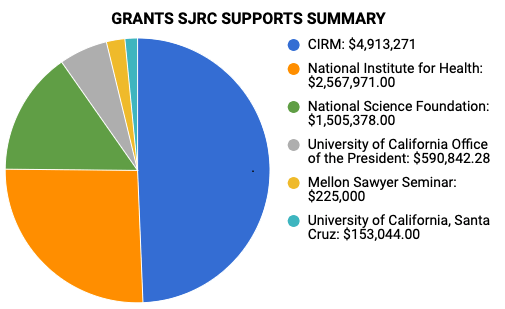 Additional grant funding and donor contributions will secure our efforts to build an internationally recognized program that trains the next generation of scholars to responsibly take up the important social and scientific problems of our time. Higher levels of grant writing support will help us to develop our research infrastructure and our ability to obtain large-scale grants. Our ambitious fundraising goals and sustained efforts to pursue grant and foundation funding will continue the growth and vitality of our work and community.
Additional grant funding and donor contributions will secure our efforts to build an internationally recognized program that trains the next generation of scholars to responsibly take up the important social and scientific problems of our time. Higher levels of grant writing support will help us to develop our research infrastructure and our ability to obtain large-scale grants. Our ambitious fundraising goals and sustained efforts to pursue grant and foundation funding will continue the growth and vitality of our work and community.
As we look to the future, we seek to continue to build SJRC as a hub for extramural funding of research projects with links to science and justice.
Reflecting on Our Progress and Looking Ahead
The 2022-23 academic year marked the end of our eleventh year as a research center. The SJRC has become a dynamic and collaborative infrastructure for training the next generation of humanities, natural and social science researchers and engineers who are trained to pursue their research and make discoveries in ecosystems where ethics and justice are primary concerns. The Center and its affiliated faculty remained key partners in creating innovative training, curriculum, and research across campus that recognizes the questions of ethics and justice at stake as we forge knowledge and innovations. In particular, we continued to deepen our collaborations with our colleagues in Science and Engineering, particularly through future HBCU Summer Undergraduate programs; and our colleagues in Critical Race and Ethnic Studies to develop an undergraduate minor in Science and Justice. We also deepened and extended our national and international networks through the launch of our LEED initiative.
Reflecting on our progress and growth, we continue to refine Center practices, and document them in the SJRC Handbook. Center Manager, Colleen Stone continued to meet with Director Jenny Reardon and Sociology Department Manager Jessica Lawrence to better understand and delineate responsibilities of administrative tasks related to running the Center. Reardon and Stone also continued to envision specific ways in which SJRC can provide effective support to the educational and research efforts of our diverse faculty community.
We are committed to developing future research collaborations, and seek collaborators from all divisions at UCSC and in the UC system, as well as in the community. We will continue to provide a critical and dynamic space that supports the diverse needs of our faculty, researchers, students, and staff.
As we plan the year ahead, we are especially excited to begin gathering in-person again! We will do our best to keep hybrid activities available. Top activities we look forward to are our Mellon Foundation Sawyer Seminar on Race, Empire, and the Environments of Biomedicine with Jennifer Derr and The Humanities Institute, launching a faculty recruitment in Critical Race STS and a Hub to build a Science and Justice minor with the Critical Race and Ethnic Studies Department, planning the next winter visit with Seoul National University, working with SJRC Director of Teaching James Doucet-Battle to advance Building Diversity in Sociology and Science and Technology Studies, and launching our LEED initiative.
SJRC’s promise is simple and bold. The benefits are manifold: improved outcomes not just for humans, but for the many non-human lives as well; approaches to science and technology that balance prosperity and justice, health, ecological survival and ethics. Our affiliated researchers and interdisciplinary teams have built decades of scholastic expertise examining the life sciences and biomedicine, health, environment, food, and racial and economic justice. The Center provides the critical milieu in which the creative sharing of this expertise leads to novel justice praxis and knowledge sharing that fosters and supports diverse lives and futures.
Thank you for making a more just world possible!
Appendix 1: Visiting Scholars
Lindsay Kelley | Senior Lecturer in the College of Arts & Social Sciences School of Art & Design at Australian National University and a UC Santa Cruz Alum (MFA Digital Arts & New Media, Ph.D History of Consciousness). (Spring 2023)
Doogab Yi | Associate Professor of Science Studies at Seoul National University and Director of The SNU in the World Program on Innovation, Science and Justice (Winter 2023, 2024, 2025). For more information refer to the SNU Project page.
Appendix 2: Science & Justice Working Group (SJWG) Events, Experimental Mixers, and Reading Groups
Our 2022-2023 events are linked below for more information.
- October 7-9, 2022 | Playing with Fire: a Hot Symposium
- October 12, 2022 | Meet & Greet
- October 18, 2022 | Sawyer Seminar Inauguration: Tahir Amin on Intellectual Property Wars: The Battle for Access to Medicines
- October 19, 2022 | Sawyer Seminar Inauguration: Tahir Amin on Technological Colonialism: The Political Economy of Innovation and Global Health
- October 26, 2022 | Works-in-Progress: Locating the Cloud
- November 02, 2022 | Giving Day
- November 2-7, 2022 | Sawyer Seminar: Alberto Ortiz-Diaz
- November 09, 2022 | Monica Barra on Alternative Restorations
- Canceled – November 17, 2022 | Book Launch! Unsettled Borders: Militarized Border Technologies and Indigenous Sacred Science
- Canceled – November 28, 2022 | Book Launch! Contesting Race and Citizenship: Youth Politics in the Black Mediterranean
- January 27, 2023 | Sawyer Seminar: Kaushik Sunder Rajan on Ethnographic Trans-formations: Cases, Life Histories, and Other Entanglements of Emergent Research
- February 21, 2023 | “Why Is Publishing So White?” An Evening with Richard Jean So
- March 7-8, 2023 | Sawyer Seminar: Wangui Muigai on Fighting for Life: Race and the Limits of Infant Survival
- April 05, 2023 | BME80G Series: Joseph Graves on “Racism, Not Race: Answers to the most critical questions”
- April 12, 2023 | BME80G Series: Krystal Tsosie on “Referring to Whom? The ‘Indigenous Reference Genome’”
- April 19, 2023 | BME80G Series: Zac Zimmer on “Metaphors for Models”
- April 19, 2023 | Sawyer Seminar: Karina L. Walters on Transcending Historical Trauma: How to Address American Indian Health Inequities and Promote Thriving
- April 26, 2023 | BME80G Series: Benjamin Hale on “Clean Meat and Muddy Markets: Substitution and Indeterminacy in Consumerist Solutions to Animal Agriculture”
- May 01, 2023 | Baking Strange with Lindsay Kelley
- May 03, 2023 | Book Launch! Unsettled Borders: Militarized Border Technologies and Indigenous Sacred Science
- May 03, 2023 | BME80G Series: Victoria M. Massie on “Of Albert Perry: A Biomythography of Genetic African Origins”
- May 10-11, 2023 | Sawyer Seminar: Anna Barry-Jester on “From Symptom to Story: Understanding an Epidemic of Kidney Disease in Central America”
- May 15, 2023 | BME80G Series: Hank Greely on “Weird Sh!t: Organoids, Chimeras, and Embryo Models”
- May 22, 2023 | Book Launch! Contesting Race and Citizenship: Youth Politics in the Black Mediterranean
- May 24, 2023 | Works-in-Progress with Lindsay Kelley on Baking Strange
- May 31-June 01, 2023 | Sawyer Seminar: Juan Sebastian Gil-Riaño on Stolen Evidence: Indigenous Children and Bio-historical narratives of the Western Hemisphere during the Cold War
- May 31, 2023 | BME80G Series: Marcy Darnovsky on “Should We Genetically Modify Our Children?”
- June 05, 2023 | BME80G Series: Alexandra Minna Stern on “Eugenics, State Harm, and Reparations in California: An Unfinished History”
- June 07, 2023 | BME80G Series: Susan Reverby on “Examining Tuskegee: The Infamous Syphilis Study and its Legacy”
- June 20, 2023 | Incorporating Indigenous Ethics and World Views in STEM Education
Appendix 3: Research Clusters & Projects
Building Diversity in Sociology and Science and Technology Studies Initiative
As efforts to increase the diversity of both researchers and the researched in STEM have gained in prominence, the number of underrepresented graduate students working in Science and Technology Studies (STS) remains unacceptably low in the United States. While substantial resources have been allocated to address pipeline issues in STEM and to a lesser extent the social sciences, to our knowledge, few exist that specifically focus on training the next generation of STS scholars of color who can provide critical guidance and nuanced expertise on justice and equity concerns in STEM. The Sociology Department at UC Santa Cruz, with the Science & Justice Research Center, endeavors to better fulfill department and university missions by increasing the number of underrepresented graduate students in STEM and STS. In particular, we aim to create inclusive and innovative spaces that foster intellectual excellence in our fields and which further builds out academic associations that reflect the diversity of our state.
We situate our work examining the interrelated problem of diversity in both science and society at the intersections of sociology and science, technology, and society studies. Our Sociology of Science and Technology Studies Pathways Project aims to map out the critical skills needed for building capacities to address current and future problems that require a broad analytical span of disciplines and expert areas of practice. A vitally important aspect of the Pathways Project involves undergraduate students in contributing to making robust intellectual linkages between the social sciences, history, politics, and genomic science to better understand diversity in the lab and in the society. For more information, contact James Doucet-Battle.
Just Biomedicine
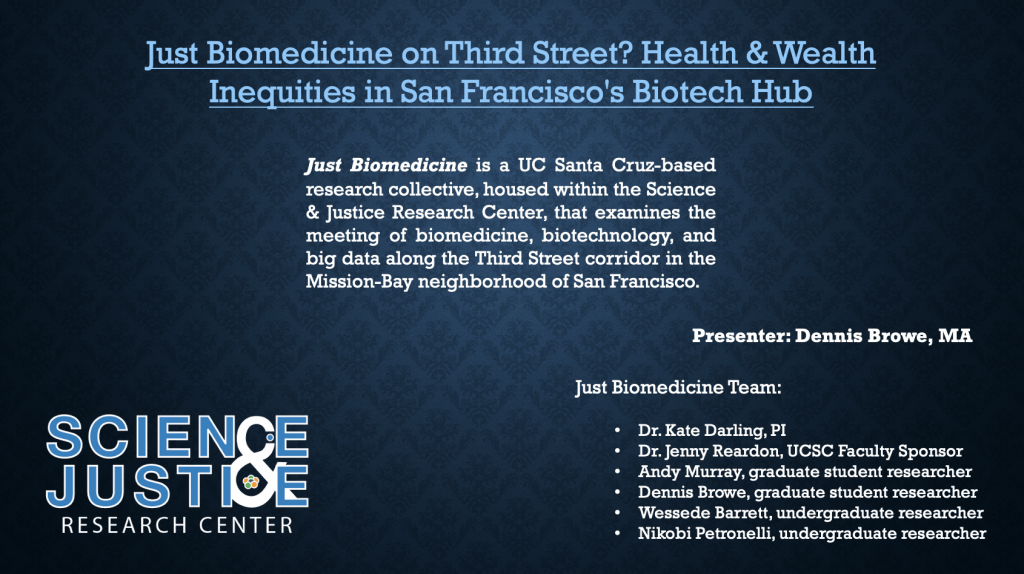 Just Biomedicine is a UC Santa Cruz-based research collective that examines the meeting of biomedicine, biotechnology, and big data along the Third Street corridor in the Mission-Bay neighborhood of San Francisco. Many hope that this convergence will democratize access to health information and produce revolutionary new medical treatments that new companies will make available to the public through market mechanisms. Yet, as in other domains, living with technoscientific transformations over time reveals how they produce new inequalities and injustices: new challenges to democratic governance; new surveillance regimes; and new forms of social stratification.
Just Biomedicine is a UC Santa Cruz-based research collective that examines the meeting of biomedicine, biotechnology, and big data along the Third Street corridor in the Mission-Bay neighborhood of San Francisco. Many hope that this convergence will democratize access to health information and produce revolutionary new medical treatments that new companies will make available to the public through market mechanisms. Yet, as in other domains, living with technoscientific transformations over time reveals how they produce new inequalities and injustices: new challenges to democratic governance; new surveillance regimes; and new forms of social stratification.
The team continued presenting their findings publicly and at other academic institutions and professional academic associations. In Winter 2023, graduate student researcher Dennis Browe (sociology) and SJRC Director Jenny Reradon presented on Just Biomedicine at UC San Francisco as part of the SNU in the World Program. Here they are on a walking tour of the Third Street corridor in the Mission-Bay neighborhood of San Francisco. Photo by Jenny Reardon in front of the Joan and Sanford Weill Neurosciences Building.
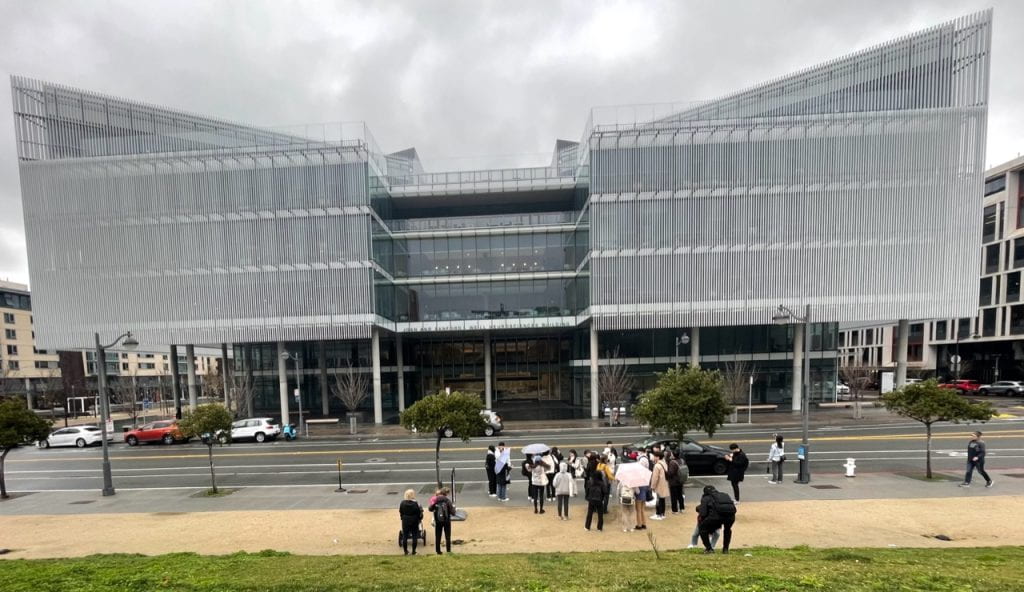
The SNU in the World Program on Innovation, Science and Justice in front of the Joan and Sanford Weill Neurosciences Building as part of the Just Biomedicine Third Street Walking Tour, San Francisco. Photo by Jenny Reardon
SJRC Director Jenny Reardon continued her service on the advisory board for the Center for ELSI Resources and Analysis (CERA). CERA is a new national center establishing a reliable online platform for scientists, scholars, policymakers, journalists and the general public to learn about the ethical, legal and social implications of genetics and genomics (ELSI) and fostering a community of multi-disciplinary researchers focused on ELSI research. CERA is funded by the National Human Genome Research Institute (NHGRI) at the National Institutes of Health (NIH) and co-led by the Stanford Center for Biomedical Ethics and the Division of Ethics at Columbia University in partnership with The Hastings Center and the Personal Genetics Education Project at Harvard University by Co-Principal Investigators Mildred Cho (Associate Director Stanford Center for Biomedical Ethics) and Sandra Soo-Jin Lee (Chief, Division of Ethics Department of Medical Humanities and Ethics at Columbia University). To get involved, contact Jenny Reardon.
Leadership in the Ethical and Equitable Design of STEM research (LEED)
Increasingly public and private funders recognize the critical importance of incorporating ethical and societal analysis into the design of science, technology, engineering, and math (STEM) research. Despite this growing demand, there is little guidance on best practices for fostering this integration or for evaluating its effects. This initiative—a national and international collaboration—aims to clarify, review, and revitalize the roles and value of engaging bioethicists and scholars in the social sciences, humanities, and the arts in STEM research. It proceeds in three phases: background research; drafting of LEED Principles and Practices; and International Discussion and Write-Up of LEED Principles and Practices. If you would like to take part in or contribute to this project, email Jenny Reardon. Learn more.
Race, Empire, and the Environments of Biomedicine
Thanks to a generous grant from The Andrew W. Mellon Foundation, through a seminar working group led by Professors Jennifer Derr (History) and Jenny Reardon (Sociology), faculty and students at UC Santa Cruz will continue to have a chance to critically investigate the relationships among medicine, race, and the environment both in the United States and in other regions of the globe shaped by the influence of American medicine. The project hired graduate students and a postdoctoral scholar.
The Andrew W. Mellon Foundation Sawyer Seminar on “Race, Empire, and the Environments of Biomedicine” hosted public lectures, scholarly talks, and a regular interdisciplinary reading and discussion group, interrogating the intersections among race, empire, and the environment, and their significance in the theory, practice, and structure of American biomedicine. Learn more at this campus news article or visit the project page.
The SNU in the World Program: Innovation, Science and Justice at UC Santa Cruz
The SNU in the World Program, administered by the Office of International Affairs (OIA) at Seoul National University (https://oia.snu.ac.kr/snu-world-program-swp) is a university-led and government-funded initiative to train undergraduate students to be globally engaged scholars and leaders. The SNU in the World Program with the Science & Justice Research Center (SJRC) at UC Santa Cruz is coordinated through the Science & Justice Research Center’s Visiting Scholar Program with Doogab Yi, Associate Professor of Science Studies at Seoul National University (https://bit.ly/2P9b7Wi). The SNU in the World Program at UC Santa Cruz is one of five other programs selected for funding and focuses on Innovation, Science and Justice. Other SNU Programs include visits to Washington DC (public policy), Japan (sustainable development), and Australia (climate crisis). If you would like to take part in or contribute to this partnership, email Jenny Reardon and Colleen Stone. Learn more.
Appendix 4: SJRC Publications Launched in 2022-2023
Contesting Race and Citizenship: Youth Politics in the Black Mediterranean (Cornell University Press, 2022)
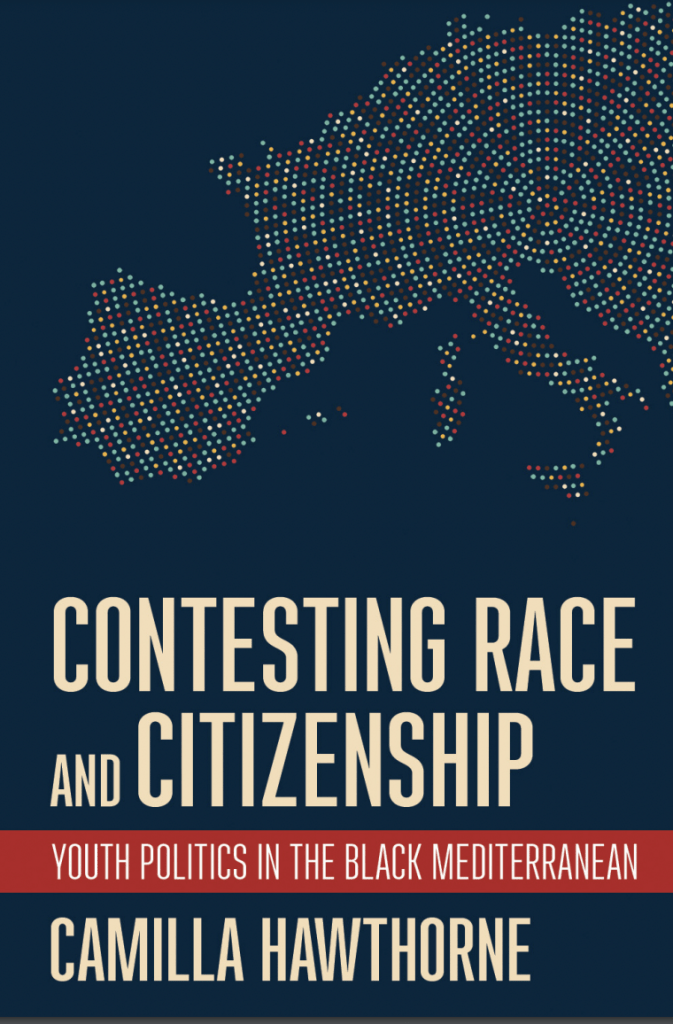
Contesting Race and Citizenship: Youth Politics in the Black Mediterranean (Cornell University Press, 2022)
Contesting Race and Citizenship is an original study of Black politics and varieties of political mobilization in Italy. Although there is extensive research on first-generation immigrants and refugees who traveled from Africa to Italy, there is little scholarship about the experiences of Black people who were born and raised in Italy. SJRC affiliated faculty Camilla Hawthorne focuses on the ways Italians of African descent have become entangled with processes of redefining the legal, racial, cultural, and economic boundaries of Italy and by extension, Europe itself.
Contesting Race and Citizenship traces not only mobilizations for national citizenship but also the more capacious, transnational Black diasporic possibilities that emerge when activists confront the ethical and political limits of citizenship as a means for securing meaningful, lasting racial justice—possibilities that are based on shared critiques of the racial state and shared histories of racial capitalism and colonialism.
More information can be found at: https://www.cornellpress.cornell.edu/book/9781501762291/contesting-race-and-citizenship.
The open-access ebook version can be downloaded at: https://d119vjm4apzmdm.cloudfront.net/open-access/pdfs/9781501762307.pdf
Unsettled Borders: The Militarized Science of Surveillance on Sacred Indigenous Land (Duke University Press, August 2022)
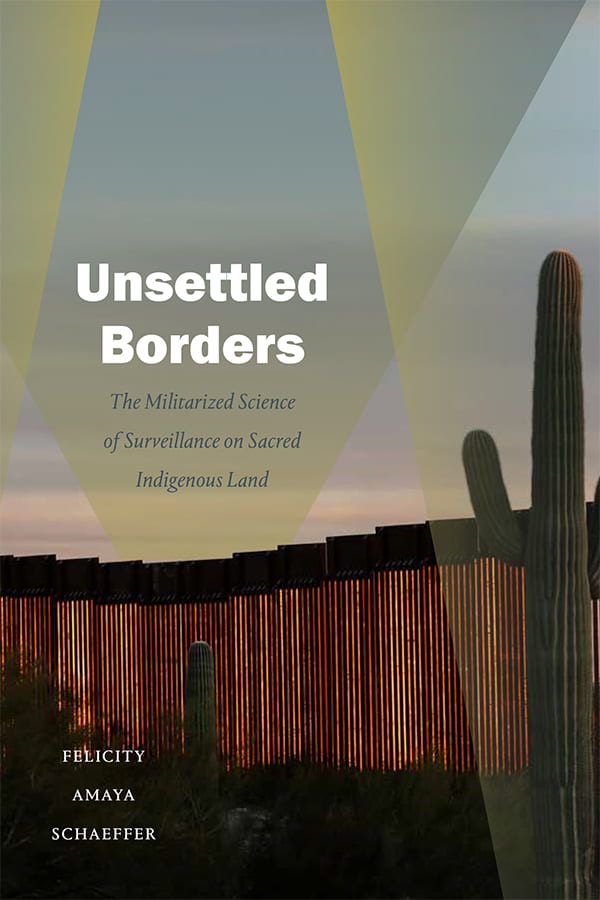
Unsettled Borders: The Militarized Science of Surveillance on Sacred Indigenous Land (Duke University Press, 2022)
In Unsettled Borders SJRC affiliate faculty Felicity Amaya Schaeffer (Feminist Studies) examines the ongoing settler colonial war over the US-Mexico border from the perspective of Apache, Tohono O’odham, and Maya who fight to protect their sacred land. Schaeffer traces the scientific and technological development of militarized border surveillance across time and space from Spanish colonial lookout points in Arizona and Mexico to the Indian wars, when the US cavalry hired Native scouts to track Apache fleeing into Mexico, to the occupation of the Tohono O’odham reservation and the recent launch of robotic bee swarms. Labeled “Optics Valley,” Arizona builds on a global history of violent dispossession and containment of Native peoples and migrants by branding itself as a profitable hub for surveillance. Schaeffer reverses the logic of borders by turning to Indigenous sacred sciences: ancestral land-based practices that are critical to reversing the ecological and social violence of surveillance, extraction, and occupation.
Learn more about Unsettled Borders in this campus news article:
https://news.ucsc.edu/2022/07/felicity-schaeffer-unsettled-borders.html
Appendix 5: Contributions to Policy
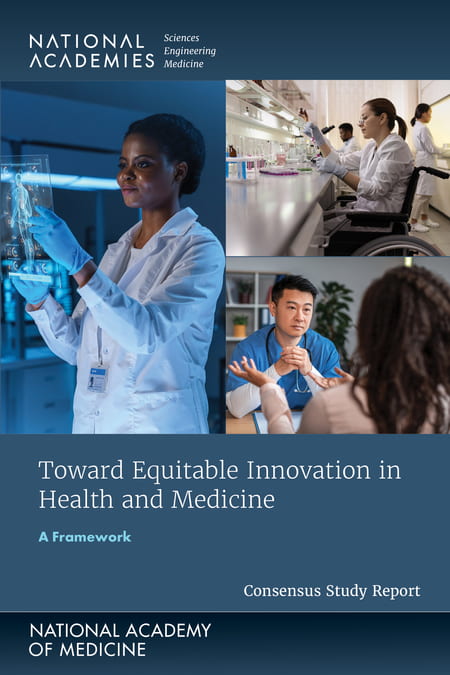 Toward Equitable Innovation in Health and Medicine: A Framework
Toward Equitable Innovation in Health and Medicine: A Framework
Jenny Reardon (sociology) served as a reviewer for this National Academies of Sciences, Engineering and Medicine (NASEM) report that put forward a cross-sectoral governance framework for considering potential benefits and risks that emerging science, technology, and innovation in health and medicine can bring to society, with a focus on equity.
 Building Bridges, Earning Trust: The WHY and the HOW of Public Trust in Science
Building Bridges, Earning Trust: The WHY and the HOW of Public Trust in Science
Jenny Reardon (sociology) served on a panel on public trust in science that was a basis of this Aspen Institute Report.
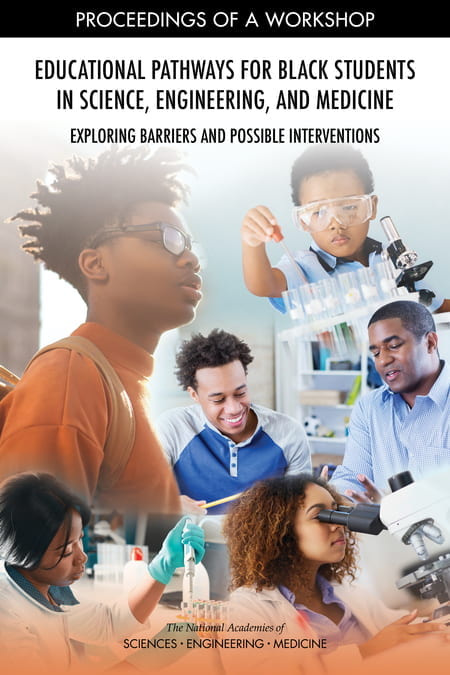 Educational Pathways for Black Students in Science, Engineering, and Medicine Exploring Barriers and Possible Interventions: Proceedings of a Workshop
Educational Pathways for Black Students in Science, Engineering, and Medicine Exploring Barriers and Possible Interventions: Proceedings of a Workshop
James Doucet-Battle (sociology) served as a reviewer of this National Academies of Science, Engineering and Medicine (NASEM) report that provided a platform to explore challenges and opportunities, beginning in the earliest years of life through K-12 schooling, undergraduate and postgraduate education, and into the workforce.
Appendix 6: SJRC Funders
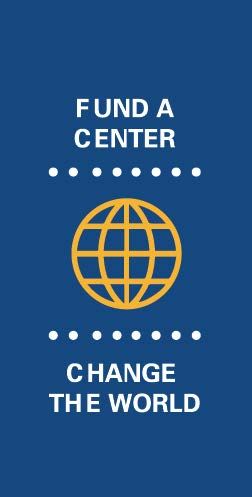 Since 2004, the SJRC has helped faculty across campus raise over $10 million in grants for collaborative research including training grants by the National Science Foundation, National Institutes for Health and California Institute for Regenerative Medicine (CIRM). Below is a summary of active awards. A full breakdown of external and internal grants and gifts can be found in Appendix 8: Key Accomplishments.
Since 2004, the SJRC has helped faculty across campus raise over $10 million in grants for collaborative research including training grants by the National Science Foundation, National Institutes for Health and California Institute for Regenerative Medicine (CIRM). Below is a summary of active awards. A full breakdown of external and internal grants and gifts can be found in Appendix 8: Key Accomplishments.
Current Funded Initiatives
LEED: Leadership in the Equitable and Ethical Design of Science and Engineering
Funding Agency: National Science Foundation ER2-Ethical & Responsible Research
Principal Investigator: Jenny Reardon
Amount: $399,994
Race, Empire, and the Environments of Biomedicine
Funding Agency: Andrew W. Mellon Foundation
Principal Investigator: Jennifer Derr, with Co-PI Jenny Reardon
Amount: $225,000
Science and Justice Minor Research and Planning Cluster
Funding Agency: The UCSC Office of Research, SEED Grant
Principal Investigator: Christine Hong, with Co-PI Jenny Reardon
Amount: $40,000 (applied) (awarded by Division of Humanities)
Building Sociology and Science and Technology Studies
Funding Agency: Institute for Social Transformation’s Building Belonging Program
Principal Investigator: James Doucet-Battle
Amount: $6000
EDUC 4: CIRM Research Training Grant “CIRM Scholar” Awards
Funding Agency: California Institute for Regenerative Medicine (CIRM)
Principal Investigator: Institute for the Biology of Stem Cells: Camilla Forsberg, Co-PI: Lindsay Hinck
Amount: $4,913,271 ($2,500 SJRC portion)
The SNU in the World Program on Innovation, Science and Justice
Funding Agency: Office of International Affairs (OIA) at Seoul National University
Principal Investigator: UCSC Jenny Reardon; SNU Doogab Yi
Amount: $40,000
Major Sponsors
Department of Sociology
Division of Graduate Studies
Division of Humanities
Division of Physical & Biological Sciences
Division of Social Sciences
The UC Santa Cruz Office of Research
Appendix 7: SJRC 2022-2023 Org Chart
SJRC Org Chart 2022-2023 (PDF)
Appendix 8: SJRC Faculty Affiliates at UC Santa Cruz
The Science & Justice Research Center (SJRC) partners with multiple regional and international units to provide a discipline-neutral space to freely express and address areas of common concern through facilitated discussions, student exchanges, research, and training. Find out more about how affiliates support the Center.
UCSC Affiliated Faculty
SJRC Affiliated Faculty add to the liveliness of the S&J Community.
Elliot Anderson, Art
Hillary Angelo, Sociology
Neda Atanasoski, Feminist Studies
Karen Barad, Feminist Studies, History of Consciousness, and Philosophy
Chris Benner, Environmental Studies, Sociology
Angela Brooks, Biomolecular Engineering
Micha Cárdenas, Art and Design: Games and Playable Media
Nancy Chen, Anthropology
Sharon Daniel, Film & Digital Media
Jennifer Derr, History
Lindsey Dillon, Sociology
James Doucet-Battle, Sociology
Madeleine Fairbairn, Environmental Studies
Lars Fehren-Schmitz, Anthropology
Anna Friz, Film & Digital Media
Lise Getoor, Computer Science
Leilani Gilpin, Computer Science and Engineering
Julie Guthman, Community Studies
Kathleen (Kat) Gutierrez, History
Camilla Hawthorne, Sociology
Dee Hibbert-Jones, Digital Art and New Media
Christine Hong, Critical Race and Ethnic Studies, Literature
Zia Isola, Center for Biomolecular Science & Engineering
Sikina Jinnah, Environmental Studies
Naya Jones, Sociology, Global and Community Health
Geri Kerstiens, Chemistry
Amy Krauss, Feminist Studies
Andrew Mathews, Anthropology
Karen Miga, Baskin School of Engineering
Jaimie Morse, Sociology
Tamara Pico, Earth and Planetary Sciences
Jenny Reardon, Sociology
Alicia Riley, Sociology, Global and Community Health
Warren Sack, Digital Arts and New Media
Felicity Amaya Schaeffer, Feminist Studies
Beth Shapiro, Ecology and Evolutionary Biology
Matt Sparke, Politics
Beth Stephens, Art, E.A.R.T.H. Lab
Susan Strome, Molecular Cell & Developmental Biology
Anna Tsing, Anthropology
Anjuli Verma, Politics
UCSC Steering Committee
Members of the SJRC Steering Committee serve for 1 academic year (renewable). The committee advises the Center on its research, community involvement, programing, and building the Science and Justice platform. It also reviews committee members and assignments, the Center’s research themes, events, visiting scholars, and steers the Center’s overall programing. The committee meets twice per term.
Jennifer Derr, History
James Doucet-Battle, Sociology
Lars Fehren-Schmitz, Anthropology
Lise Getoor, Computer Science
Dee Hibbert-Jones, Digital Art and New Media
Jaimie Morse, Sociology
Jenny Reardon, Sociology
Matt Sparke, Politics
Internal Advisory Board
Members of the SJRC Advisory Board serve for 3 academic years (renewable).Board members advise the Center on institutional support and fundraising, cultivate connections and synergy amongst partners, and help forge the overall Center vision and plans. The Board meets annually in Spring.
Elliot Anderson, Art
Karen Barad, Professor of Feminist Studies
Ed Green, Biomolecular Engineering
Zia Isola, Center for Biomolecular Science & Engineering
Warren Sack, Digital Arts & New Media
Anna Tsing, Anthropology
External Advisory Board
Geoffrey Bowker, Bioinformatics, University of California – Irvine
Joe Dumit, Anthropology, University of California – Davis
Sally Lehrman, SJRC Visitor
Laura Mamo, Health Equity Institute, San Francisco State University
Janet Shim, School of Nursing, University of California – San Francisco
Kim TallBear, Native Studies, University of Alberta, Canada
Fred Turner, Communications, Stanford
Appendix 9: SJRC Key Accomplishments
Key Accomplishments (eg: external and internal funding, grants, press coverage, research collaborations) can be found here.
February 27, 2024 | Centering Equity and Justice in Research: What Will It Take?
February 26-27, 2024
Schedule varies
University of California Santa Cruz, Silicon Valley Campus
The UC Santa Cruz Science & Justice Research Center (SJRC), in collaboration with the LEED Team, is hosting a Kick-Off meeting and public dialogue which will take place at the UCSC Silicon Valley Campus in Santa Clara from February 26th to 27th 2024. The second day will feature two public facing sessions to gather thought leaders in the domain of science and society from the UCs, Stanford, Cal State and Silicon Valley to envision how to build more equitable research practices and communities. The day will end with a public reception at 5PM, followed by a panel discussion, Centering Equity and Justice in Research: What Will It Take? The panel will bring to our campus prime movers in efforts to create just and equitable research systems. Registration.
February 27th 2024 at 5:00pm – 7:00pm PST
In 1978, the Belmont Report issued by the U.S. National Commission for the Protection of Human Subjects named justice as one of three core ethical principles that should guide research. Yet in the years that followed, researchers, policy makers, and ethicists paid much more attention to the other two principles–autonomy and beneficence–than to concerns about justice. This began to change a decade ago when social justice movements created new pressures on policy makers and scientists to attend to equity and justice. In 2013, the American Civil Liberties Union (ACLU) led the charge to overthrow gene patents, resulting in the landmark Supreme Court ruling against Myriad, a major step towards health equity. Efforts to attend to issues of equality and justice accelerated further in the wake of the Black Lives Matter protests after the murder of George Floyd in the summer of 2020. In January of 2021, the Biden-Harris Administration appointed the first Deputy Director of Science and Society in its Office of Science, Technology and Policy (OSTP) and a year later released a bold vision to achieve equity in STEMM, followed by the Blueprint for an AI Bill of Rights in October 2022. Most recently, in August of 2023 the National Academies of Sciences, Engineering, and Medicine (NASEM) issued a report calling for the U.S. to center equity in health care innovation.
This panel brings together central architects and prime movers of these efforts to reflect on the progress that has been made and the work that lies ahead. Join us as we imagine this next chapter of the critical revolution to create just and equitable research systems that not only foster innovation, but create trustworthy sciences, technologies and societies.
Panelists
Ray Fouché, Professor of Communication Studies at Northwestern University, immediate past Division Director of Social and Economic Sciences within the Directorate of Social and Behavioral Sciences at the National Science Foundation.
Evelynn Hammonds, Barbara Gutmann Rosenkrantz Professor of the History of Science and Professor of African and African American Studies at Harvard University, co-author of the National Academy of Sciences (NAS) report, Transforming Trajectories for Women of Color in Tech (2022).
Karen Miga, Assistant Professor of Biomolecular Engineering and Associate Director of the UCSC Genomics Institute, co-lead of the telomere-to-telomere (T2T) consortium and project director of the human pangenome reference consortium (HPRC) production center at UC Santa Cruz.
Kim TallBear, (Sisseton-Wahpeton Oyate) is Professor and Canada Research Chair in Indigenous Peoples, Technoscience, and Society in the Faculty of Native Studies, University of Alberta, Canada.
Moderated by Jenny Reardon, Founding Director of the Science & Justice Research Center, UC Santa Cruz.
Refer to the LEED Project website for more information.
2024 SNU Visiting Students
Graduate Researchers
Ethan
Undergraduate Researchers
Group 1:
Jaehoon Jeong
Giyun Choi is a junior majoring in Chemical&Biological Engineering at Seoul National University. He is especially interested in Energy process system engineering. So he plans to learn more about process control, optimization and modeling.
Yoon Lee is a junior studying Sociology and Science and Technology Studies at Seoul National University. He is interested in how diverse “situated knowledges” are constructed in societies. In particular, he finds it fun how heterogenous actors entangle and understand each other within medical practices. Also, he is recently getting into AI as a new important actor producing scientific knowledge.
Eunhye Kim is a senior student majoring in Computer Science and Industrial Engineering. She has a keen interest in the field of Human-Computer Interaction (HCI) and Ergonomics. Previously, she participated in a project designing a human-machine interface for semi-autonomous vehicles. Currently, she is conducting research in HCI, aiming to help users bridge the gap between text and image data in the fashion domain. Apart from academics, she enjoys jogging, swimming, and visiting art galleries.
Che Young Yoon is a junior at Seoul National University. She belongs to the College of Liberal Studies and is majoring in psychology and business administration. She has been interested in law since young, so she wanted to go to law school, but recently, she became interested in cognitive psychology and neuroscience. By combining law and neuroscience, she wants to create innovations that use psychological mechanisms to determine whether statements are true in court. She is interested in grasping people’s habits based on psychological knowledge and applying them to the field of law, beyond simply judging the authenticity of statements.
Group 2:
Seung Seok Oh is a senior majoring in Mechanical Engineering at Seoul National University. Having strong belief in a word “Any sufficiently advanced technology is indistinguishable from magic.” by Arthur C. Clark, I am deeply fascinated by engineering, especially robotics and aerospace. I am also interested in Silicon Valley startups that are rapidly changing the face of the world.
Hangyeol Go
Nayeon Joh
Minjae Kim is a junior majoring in Pharmacy at Seoul National University. She is very interested in pharmaceutical industry and medical health system. So she wants to learn more about new drug development and research issues that pharmaceutical companies focusing on. Also she wants to know about policies and systems that can help more people become healthy.
Chaehyeon Kim is junior majoring in economics and Management of Technology and recently taking a year off to do an internship at AI startup as a developer. She is interested in the dynamics between technology and society, and especially how the start-up companies change the everyday life of people. Throughout the internship experience, she became concerned with the social structural solution of the situations that start-up companies face but which are difficult to manage to pull themselves up by their bootstraps
Group 3:
Dong Uk Kim is a junior at Seoul National University, is majoring in Nuclear Engineering, with a keen focus on materials science within this field. He actively explores innovative nuclear plant designs and the critical materials required for their construction. He is also interested in assessing the role of nuclear energy in ethical and policy aspect, particularly as it relates to the global transition towards a low-carbon future.
JunHyeok Park
Nahyun Kim is a junior majoring in Painting at the Collage of Fine Arts and Anthropology at the Collage of Social Science. I am interested in how our visual culture has influenced our identity. In particular, I am interested in the methodology that Japan adopted after World War II to explain its own visual culture as ‘Japan’s uniqueness’ by separating it from Western influences, and the dangers of the linear historical perspective it entails. In relation to this program, I want to take a closer look at the potential social alienation that various revolutions in science and technology might bring about. By doing so, I aim to explore the possibility of caring for more microscopic extras by the area of art, rather than focusing on macroscopic transformations.
Yeongseo Shin is a junior majoring in college of Pharmacy at Seoul National University. I am very interested in science that considers society. I would like to ask how the U.S. viewed and responded to the reality of the medical gap, especially in the ‘health disparity’ class. I am also curious about the level of personalized medical care and the status of social institutions in the United States. Also, I wonder development of social, legal and ethical discussion about new technology innovation. I’m looking forward to getting diverse experiences and insights through this program!
Yoonwon Lee is a freshman majoring in Business at Seoul National University.
Group 4:
Hyeokjung Choi is a junior majoring in Business Administration at Seoul National University. He is deeply passionate about the innovation and productivity that flourish within a free and dynamic market, and hopes to provide a stable foundation for it. Currently, his field of interest is the appropriate valuation of technological innovations and IPOs of related start-ups, which accompanies due diligence. Also, he is interested in various topics of finance including financial crisis and its relation with governmental activities.
Kyunghoon Han is a sophomore majoring in mechanical engineering. I’m interested in AI technology and robotics. I’m planning to study and research some wearable devices. Through this snu-in program, I want to discuss social problems related to science technology like AI. Also, it will be a great time to share idea about science issue like CES2024 while touring companies in silicon valley.
Jwa Yewon is a freshman majoring in Medicine at Seoul National University. I think that future innovations such as genetic motification may impact on social inequility if we use these not properly, so i am interested in the way that we take advantage of innovations wisely and i want to shate various ideas with you !
Minyoung Shin is a biology major, and the reason I love biology is because the more I learn, the more I understand about human beings and life. It fascinates me that we can use the scientific method to find answers to questions like “Who am I? How does my body and mind work?” So I’m particularly interested in genetics, which explains the origins of humanity and our innate dispositions, and neuroscience, which allows us to understand human thoughts and emotions as electrochemical interactions. I’m also very interested in STS, which studies the relationship between science, people, and society. This semester, I took some courses that allowed me to broaden my horizons by discussing issues related to science and technology from a social and philosophical perspective. I hope to gain a variety of experiences at SNU in San Francisco to further refine my interests.
Seeun Lee is a junior majoring in Food Biotechnology at Seoul National University. I have a lot of interest in “Decarbonization of the Food Industry”. Furthermore, I wish to learn about the recent researches going on and values that IT giants are pursuing in the biomedical field.
Group 5:
Junwoo Kim is a sophomore majoring in business administration at College of Liberal Studies of Seoul National University. He’s also considering to major in architecture or design his own Student Designed Major combining architecture, sociology and anthropology. His interests can divided in two ways; interest in start-ups as a job, and personal interest in architecture or urban sociology especially how people and any buildings, cities, places, or any ‘spaces’ interact with each other. Also it has been always most interesting part for him that how companies make innovation and change the world.
Seunghoon Oh is a junior majoring in Biological Sciences at Seoul National University. He is especially interested in fields including structural biology, biochemistry and biophysics. He aims to develop a novel process for drug discovery through biophysical research, and eventually improve the affordability of personalized medicine.
Wonjae Shin is a sophomore majoring in Energy Resources Engineering at Seoul National University. He is interested in various fields surrounding energy and resources, such as GIS, energy markets, and petroleum. In particular, he is interested in the distribution of energy based on economics.
Younjin Kang is a junior majoring in Naval Architecture and Ocean Engineering, and double majoring in Computer Science Engineering. While studying artificial intelligence, she became interested in robotics and continues to study this field. Beyond technical expertise, she is passionate about understanding the social context and ethical responsibilities that accompany engineering applications.
Chaemi Song is a junior majoring in Business Administration and double majoring in Computer Science. Her academic journey is characterized by a profound interest not only in the technical aspects of artificial intelligence but also in the broader context that has shaped its evolution. She is particularly fascinated by the interplay between technological advancements and their societal impacts, especially in the realm of AI. She aims to acquire a nuanced perspective on AI that encompasses both its technological potential and its transformative role in shaping the future of human society.
Daeun Kim is a freshman majoring in Dentistry at Seoul National University School of Dentistry. While taking a Global Citizenship Education(GCED) course, she became conscious about global inequity in access to oral health care. She seeks applicable model for Universal Health Coverage (UHC) especially on oral health care.
SNU In the World Program 2023 Rapporteur Report
SNU In the World Program 2023 Rapporteur Report
Innovation, Science & Justice
University of California, Santa Cruz
January 29, 2023 – February 11, 2023
Over a two-week period in early 2023, the Science & Justice Research Center (SJRC) hosted 27 visiting scholars (including Professor Doogab Yi, 4 graduate students, and 22 undergraduates) from Seoul National University (SNU) as part of the SNU in the World Program to learn about the work being done at the University of California, Santa Cruz (UCSC) by SJRC affiliates. The SNU in the World Program, administered by the Office of International Affairs (OIA) at SNU, is a university-led and government-funded initiative to train South Korean undergraduate students to be globally engaged scholars and leaders. The SNU in the World Program at UCSC is one of five other programs selected for funding and focuses on Innovation, Science and Justice. Other SNU Programs included visits to Washington DC (public policy), Japan (sustainable development), and Australia (climate crisis).
The program was facilitated by Doogab Yi, Associate Professor of Science Studies at Seoul National University, who brought together a diverse group of students from fields including the biological sciences, chemistry, computer science, engineering, industrial design, philosophy, sociology, english, business administration, and fashion design. Over the two-week program students participated in an in-depth series of lectures, workshops, reading groups, and field trips focused on exploring some of today’s most pressing issues including biomedical innovation, environmental justice, climate change, health equity, and toxic ecologies. Students were also able to participate in the Mellon Sawyer Seminar Series “Race, Empire, and the Environments of Biomedicine” by attending Kaushik Sunder Rajar’s lecture “Ethnographic Trans-formations: Cases, Life Histories, and Other Entanglements of Emergent Research.”
With the SJRC, SNU visiting scholars learned about a few of the projects and initiatives SJRC co-directors Jenny Reardon and James Doucet-Battle are working on, including an initiative by the University of California with Historically Black Colleges and Universities (UC-HBCU) a partnership with North Carolina Agricultural & Technical State University aimed at improving diversity in UC doctoral biology programs, as well as the Leadership in Ethical & Equitable Design (LEED) of STEM Research Project. Both projects are aimed at increasing diversity within STEM research and addressing issues of equity at the intellectual and institutional level in order to secure more just and equitable forms of science and engineering. The group also met with SJRC affiliates and student fellows in the UCSC Sustainability Office, the UCSC Genomics Institute, and joined for a session of the UCSC IBSC Stem Cell Journal Club. In these sessions, they explored issues ranging from bioethical questions raised by innovative biotechnologies like stem cells, to human rights issues raised by technologies of war.
The group participated in several field trips throughout the local Bay Area including visiting with Dongoh Park, Senior Policy Advisor for Google’s Global Trust and Safety Team on the Google campus in Silicon Valley. The group also visited the UC San Francisco (UCSF) Medical Center at Mission Bay to learn about the cutting edge research and clinical treatment innovations there as well as the justice issues raised by the building of the Google campus. A highlight of the field trip was a lecture by Fred Turner, Professor of Communication at Stanford University who also serves on the SJRC Advisory Board. Professor Turner’s talk, “Cultures of Innovation,” drew on research from his award winning book From Counterculture to Cyberculture and explored how culture creates ideological models for the reimagination of technology. Turner showed how the 1960s counterculture movement influenced the emergence of cyberculture. Both are predicated on technology as a tool for personal transformation, and labor as a tool for personal growth.
While in San Francisco students participated in a walking tour of Third Street as part of the SJRC’s Just Biomedicine project. Just Biomedicine is a SJRC research collective that critically examines the meeting of biomedicine, biotechnology, and big data along the Third Street corridor in the Mission-Bay neighborhood of San Francisco, California. The walking tour was designed to allow participants to view how technoscientific transformations can build into cityscapes new inequalities and injustices (i.e., new challenges to democratic governance; new surveillance regimes; and new forms of social stratification). The walking tour allowed participants to experience the stratified health and wealth outcomes of the push towards biomedical innovation in San Francisco.
“Diversity is an open attitude that understands and respects various individuals and groups and does not exclude unjustly.”
From the presentation, “Diversity: Aligning the Ideal with the Practical,” by Min Joo Lee, Hyeon Beom Choi, Su Hyun Hur, & Yi Ji Kim.
At the end of the two-week program, project teams presented their final group research projects. Final projects covered topics including:
- how historical cases of injustice and discrimination have led to mistrust of the contemporary healthcare system; (Link)
- the need to address both ethical and practical aspects of diversity through the development of policies and incentives to enhance diversity; (Link)
- how the theoretical concept of slow science can be applied through an Environmental Social Governance (ESG) model; (Link)
- what environmental justice issues vulnerable populations in Korea are currently facing; and (Link)
- how the drive towards innovation has historically resulted in exploitation, inequity, and discrimination highlighting the new for “Just Innovation.” (Link)
All of these projects attempted to apply and analyze practical approaches to addressing issues of equity and justice in the realms of science and technology.
If you are interested in presenting or meeting with SNU in late January 2024 or late January 2025, please contact Jenny Reardon (reardon1@ucsc.edu) and Colleen Stone (colleen@ucsc.edu).
Photos:
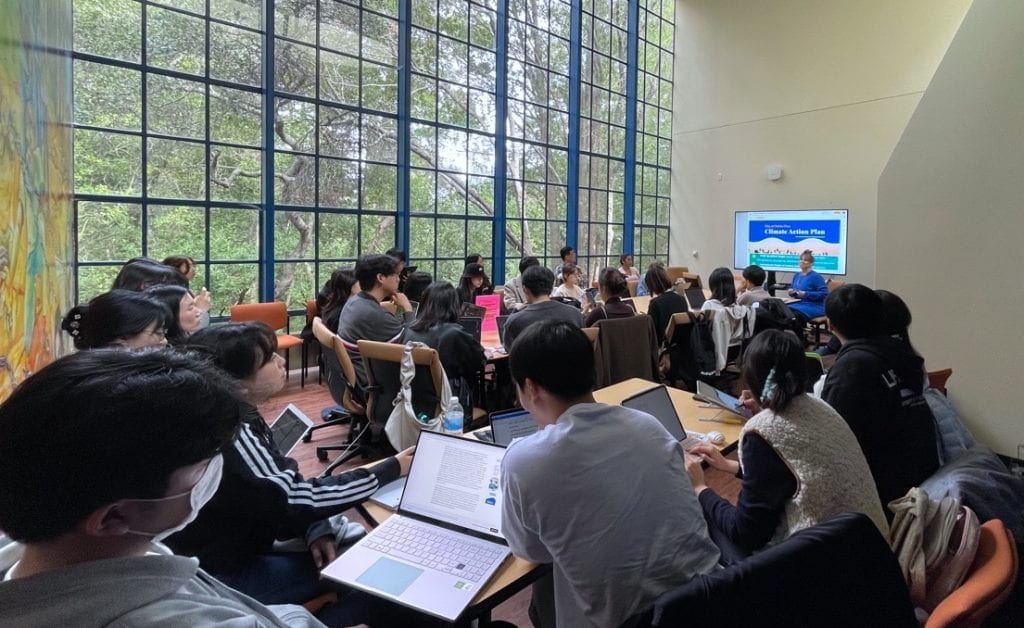
Image 1: Group lecture in the Oakes College Mural Room with Tiffany Wise-West, Sustainability and Climate Action Manager, City of Santa Cruz. Photo by Jenny Reardon.
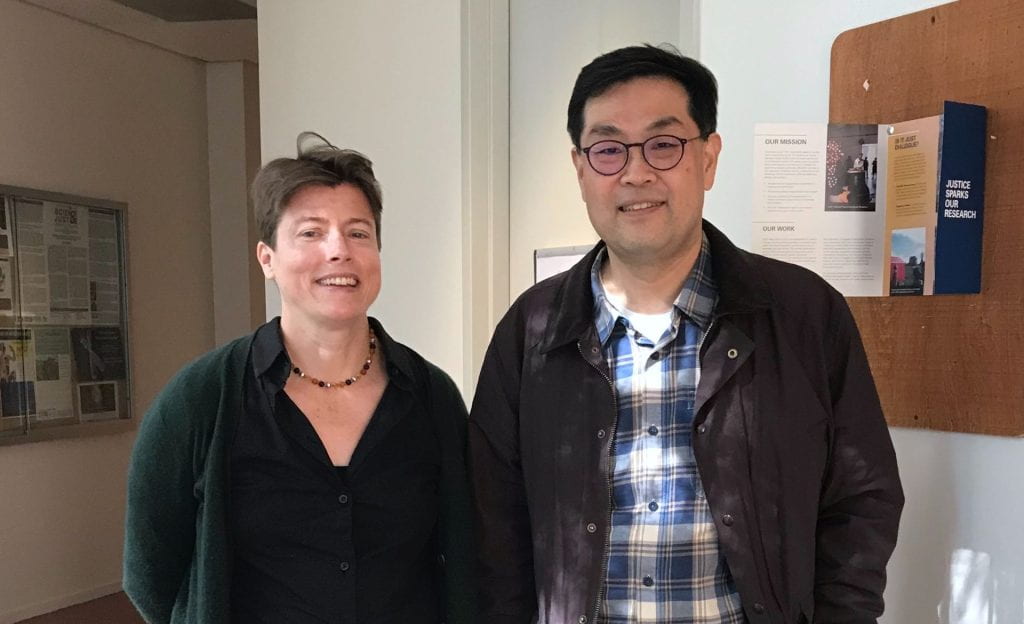
Image 2: Professor Jenny Reardon (UCSC) and Professor Doogab Yi (SNU). Photo by Colleen Stone.

Image 3: Third Street Walking Tour, San Francisco. Photo by Dennis Browe or Jenny Reardon in front of the Joan and Sanford Weill Neurosciences Building.


